'The MESSENGER
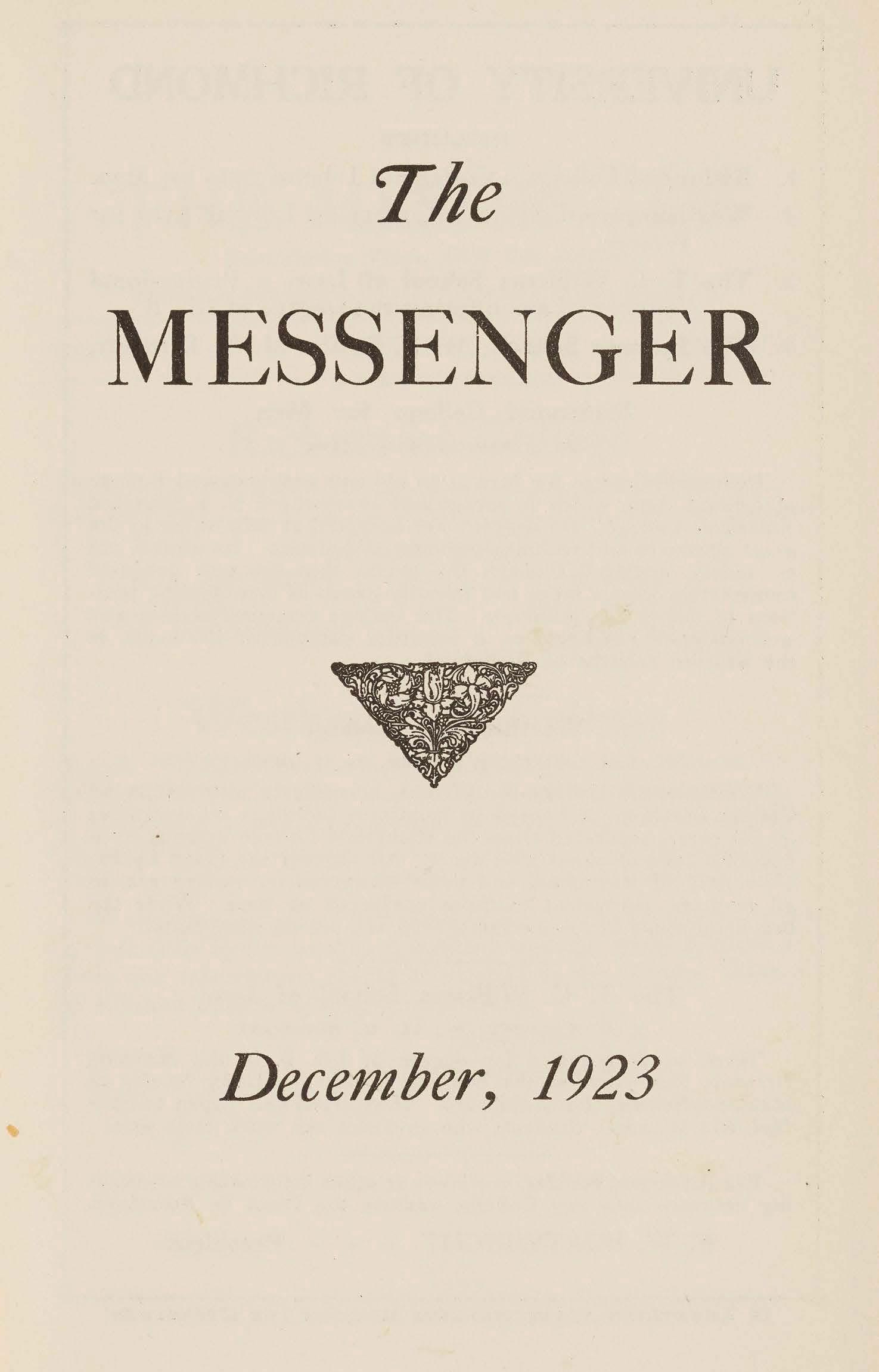
December, 1923


December, 1923
INCLUDES
1. Richmond College, a College of Liberal Arts for Men.
2. Westhampton College, a College of Liberal Arts for Women.
J 3. The T. C. Williams School of Law, a Professional School of Law, offering the Degree of LL. B.
The Summer School. W. L. Prince, M. A., Director.
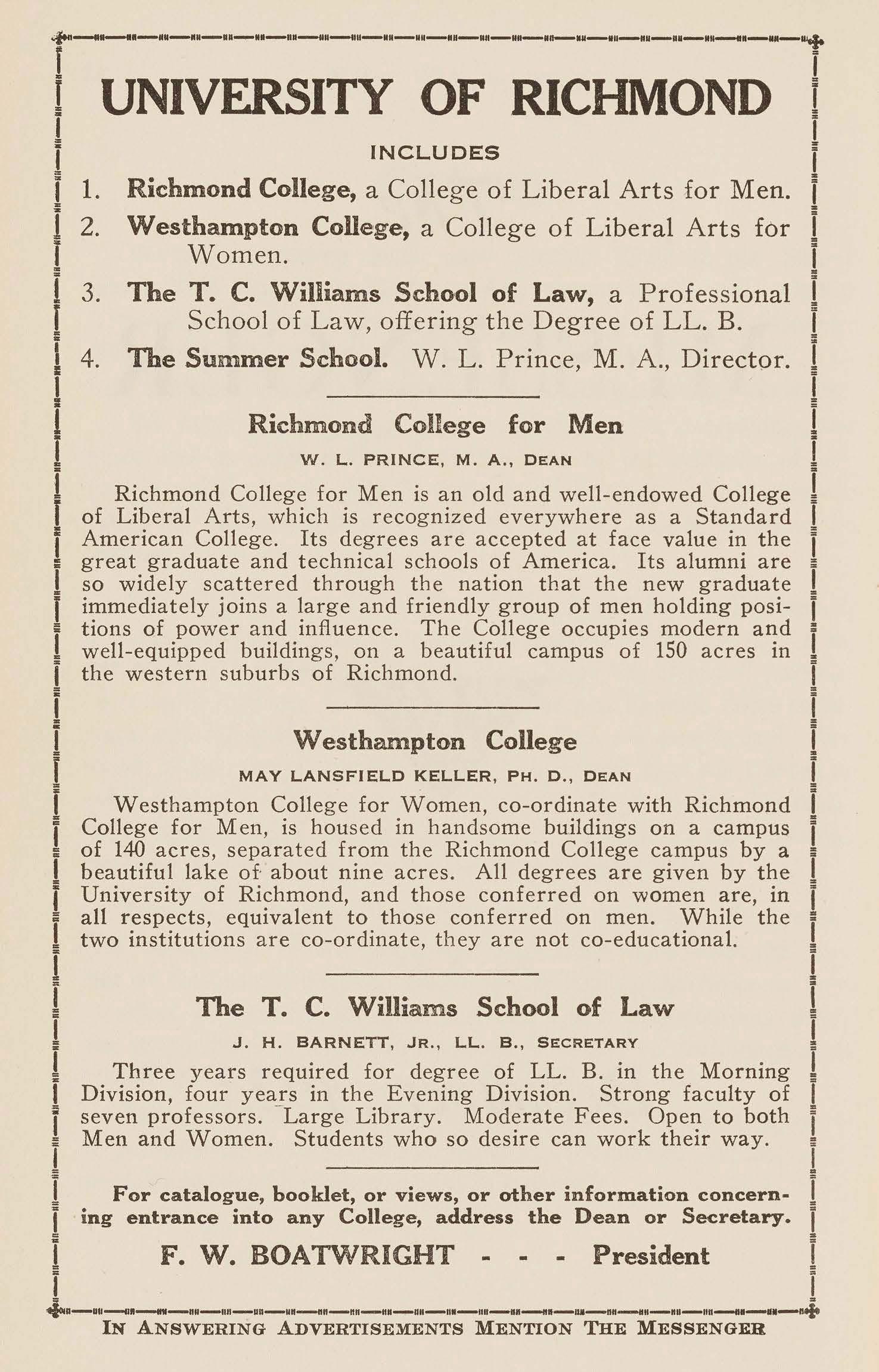
4.
W. L. PRINCE, M. A., DEAN
Richmond College for Men is an old and well-endowed College of Liberal Arts, which is recognized everywhere as a Standard American College. Its degrees are accepted at face value in the j great graduate and technical schools of America. Its alumni are • so widely scattered through the nation that the new graduate immediately joins a large and friendly group of men holding positions of power and influence. The College occupies modern and well-equipped buildings, on a beautiful campus of 150 acres in the western suburbs of Richmond.
MAY LANSFIELD KELLER, PH. D., DEAN
Westhampton College for Women, co-ordinate with Richmond College for Men, is housed in handsome buildings on a campus of 140 acres, separated from the Richmond College campus by a beautiful lake of about nine acres. All degrees are given by the University of Richmond, and those conferred on women are, in all respects, equivalent to those conferred on men. While the two institutions are co-ordinate, they are not co-educational.
J H. BARNETT, JR., LL B., SECRETARY
Three years required for degree of LL. B. in the Morning Division, four years in the Evening Division. Strong faculty of seven professors. - Large Library. Moderate Fees. Open to both Men and Women. Students who so desire can work their way.
For catalogue, booklet, or views, or other information concern- i ing entrance into any College, address the Dean or Secretary. i F. W. BOATWRIGHT President i
Subscription Price, $I.SO Per Annum

Vol. L
1923
JUDSON EV ANS, JR .__________________________________Editor-in-Chief
H. P. WHITE _______________________________________Business Manager
Associate
Editors
H. L. SMITHERS
L. C. DAVIS W. F. CUTHRIELL
K. A. PATE W. C. ATKINS C. H. ROBINSON
LOUISE WILKINSON ________________________________Editor-in-Chief
ELSIE NOLAN _____________________________________Business Manager
DR. KELLER _________________________________________Advisory Editor
DR. LANDRUM __________________ . __Advisory Editor
All contributions should be handed to the department editors or the Editor-in-Chief by the !st of each month preceding. Business communications and subscriptions should be directed to the Business Manager an d Assistant Business Manager, respectively.
AddressTHE MESSENGER, University of Richmond, Va.
3
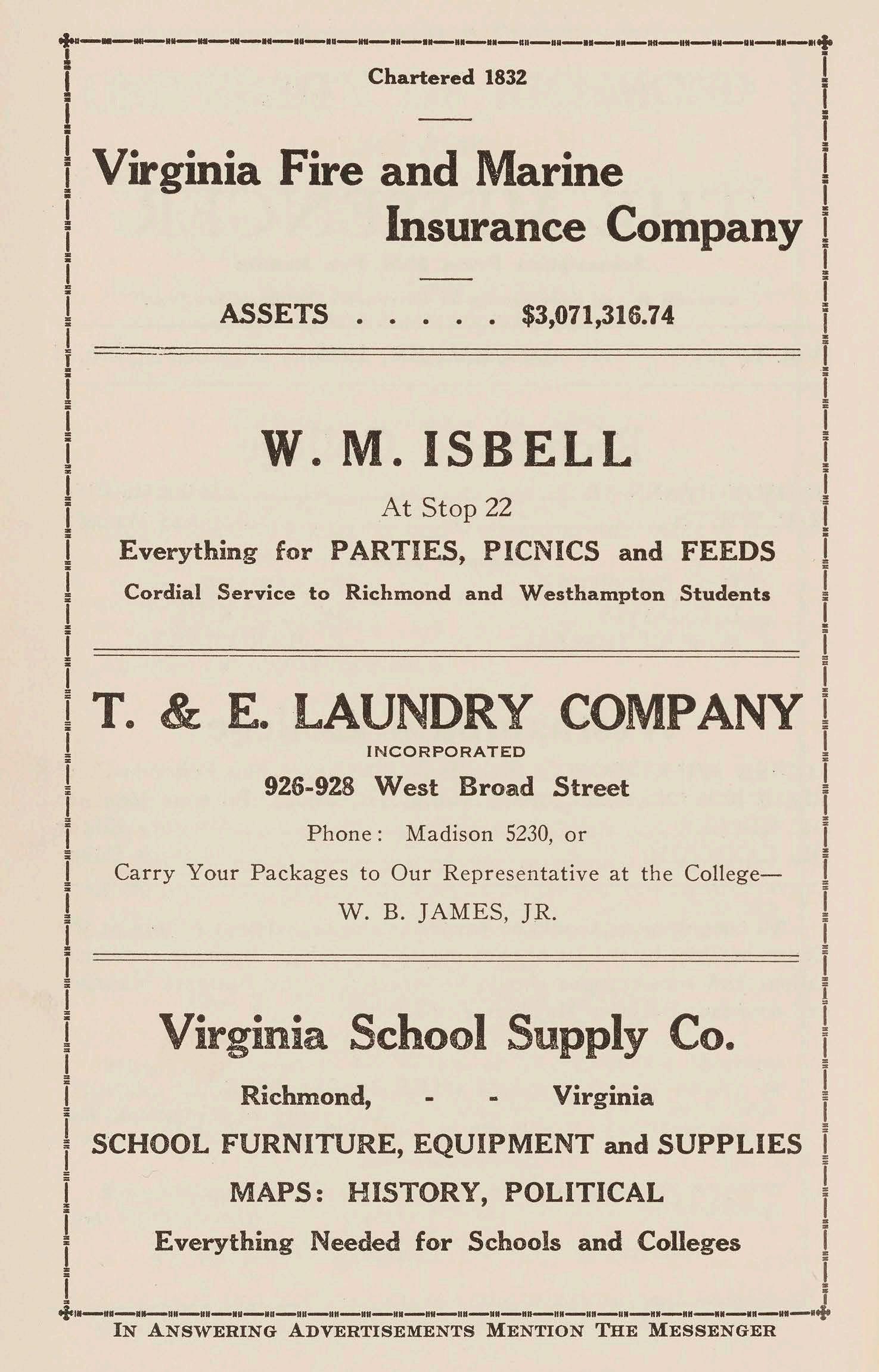
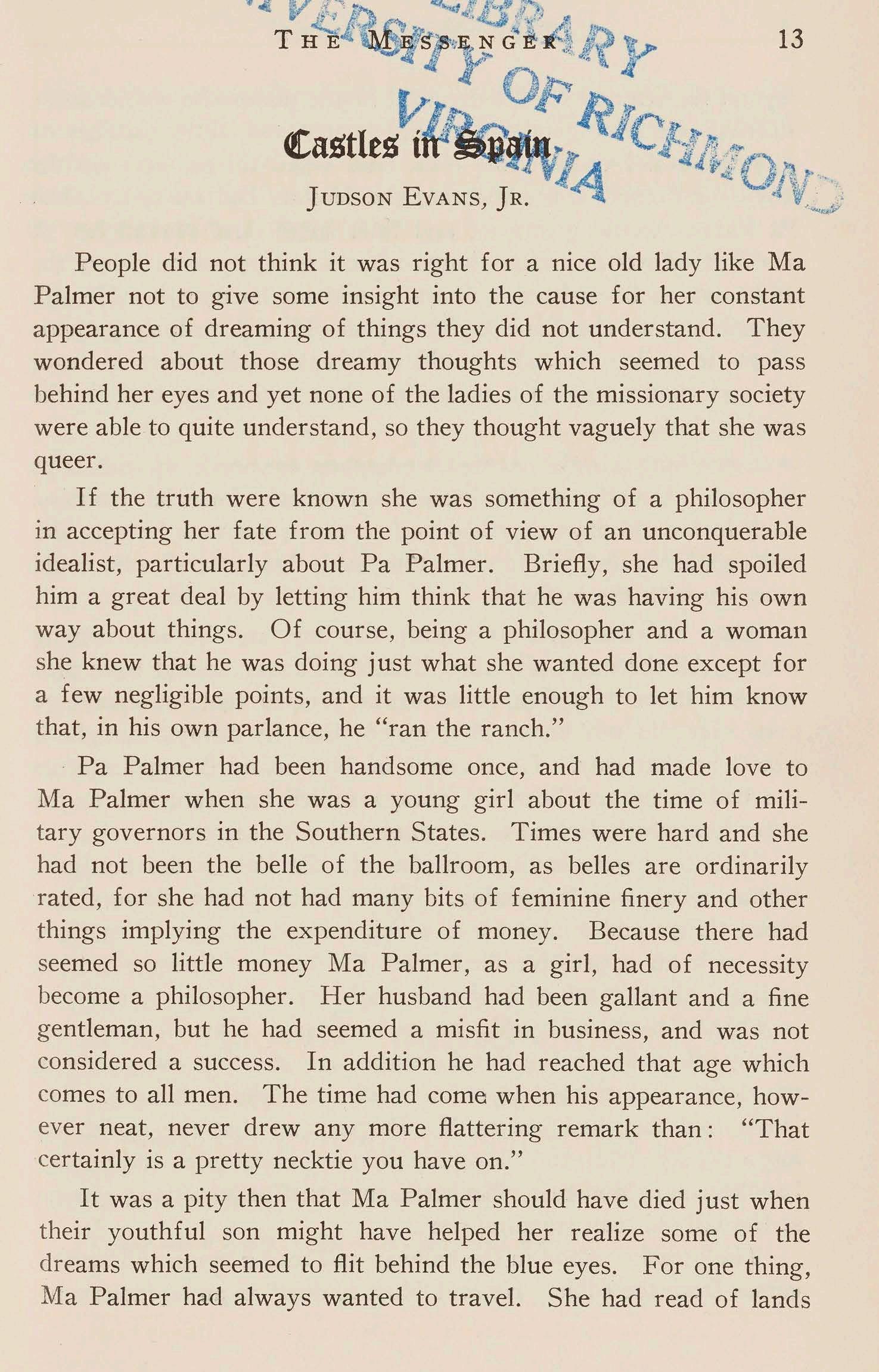
People did not think it was right for a nice old lady like Ma Palmer not to give some insight into the cause for her constant appearance of dreaming of things they did not understand. They wondered about those dreamy thoughts which seemed to pass behind her eyes and yet none of the ladies of the missionary society were able to quite understand , so they thought vaguely that she was queer.
If the truth were known she was something of a philosopher in accepting her fate from the point of view of an unconquerable idealist, particularly about Pa Palmer. Briefly, she had spoiled him a great deal by letting him think that he was having his own way about things. Of course, being a philosopher and a woman she knew that he was doing just what she wanted done except for a few negligible points, and it was little enough to let him know that, in his own parlance, he "ran the ranch."
Pa Palmer had been handsome once, and had made love to Ma Palmer when she was a young girl about the time of military governors in the Southern States. Times were hard and she had not been the belle of the ballroom, as belles are ordinarily r ated, for she had not had many bits of feminine finery and other things implying the expenditure of money. Because there had seemed so little money Ma Palmer, as a girl, had of necessity become a philosopher. Her husband had been gallant and a fine g entleman, but he had seemed a misfit in business, and was not considered a success. In addition he had reached that age which comes to all men. The time had come when his appearance, however neat, never drew any more flattering remark than: "That certainly is a pretty necktie you have on."
It was a pity then that Ma Palmer should have died just when t heir youthful son might have helped her realize some of the d reams which seemed to flit behind the blue eyes. For one thing, M a Palmer had always wanted to travel. She had read of lands
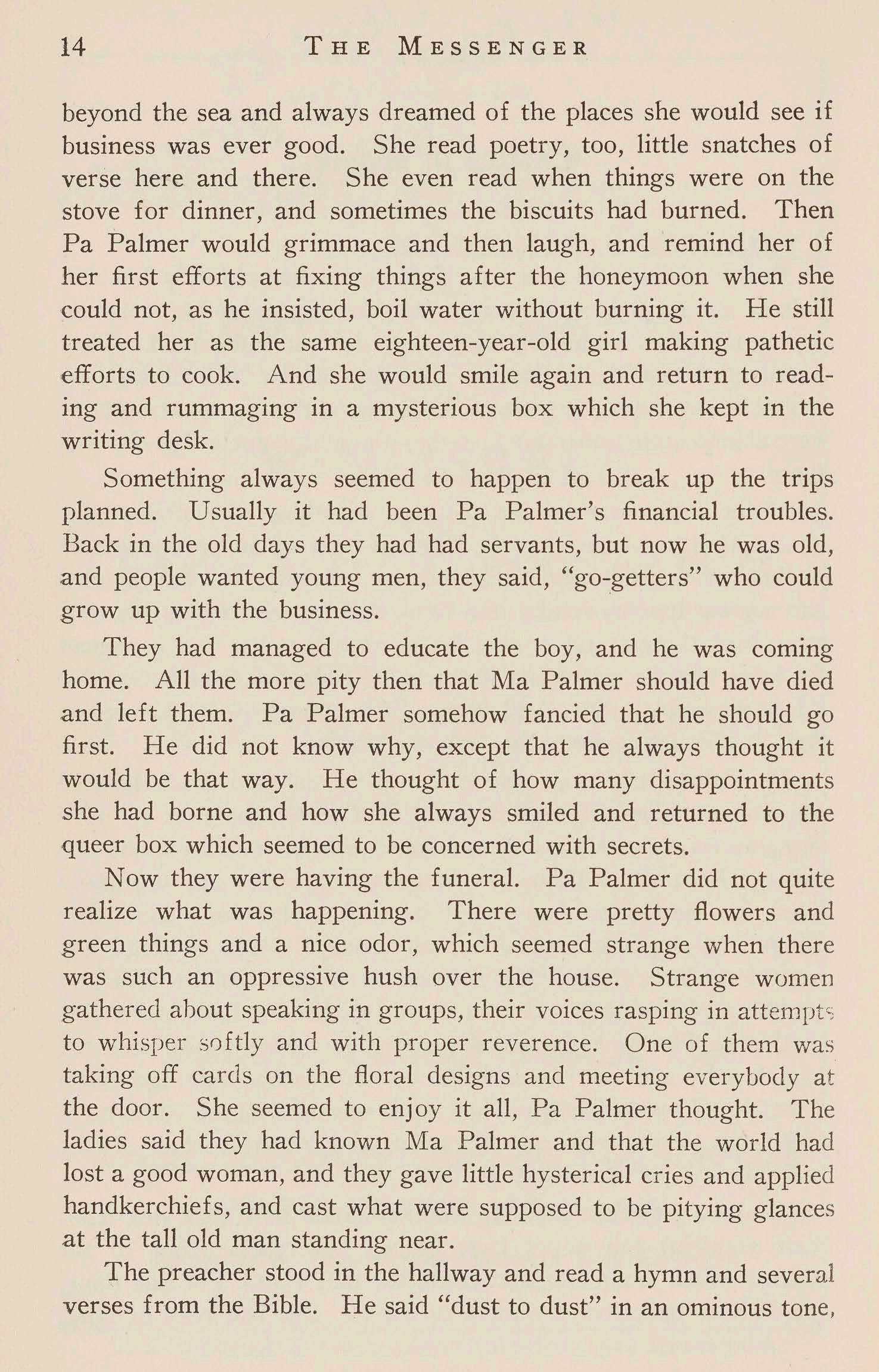
beyond the sea and always dreamed of the places she would see if business was ever good. She read poetry, too, little snatches of verse here and there. She even read when things were on the stove for dinner, and sometimes the biscuits had burned. Then Pa Palmer would grimmace and then laugh, and remind her of her first efforts at fixing things after the honeymoon when she could not, as he insisted, boil water without burning it. He still treated her as the same eighteen-year-old girl making pathetic efforts to cook. And she would smile again and return to reading and rummaging in a mysterious box which she kept in the writing desk.
Something always seemed to happen to break up the trips planned. Usually it had been Pa Palmer's financial troubles. Back in the old days they had had servants, but now he was old, and people wanted young men, they said, "go-:getters" who could grow up with the business.
They had managed to educate the boy, and he was coming home. All the more pity then that Ma Palmer should have died and le£t them. Pa Palmer somehow fancied that he should go first. He did not know why, except that he always thought it would be that way. He thought of how many disappointments she had borne and how she always smiled and returned to the queer box which seemed to be concerned with secrets.
Now they were having the funeral. Pa Palmer did not quite realize what was happening. There were pretty flowers and green things and a nice odor, which seemed strange when there was such an oppressive hush over the house. Strange women gathered about speaking in groups, their voices rasping in attemp t '-: to whisper sriftly and with proper reverence . One of them wa s taking off cards on the floral designs and meeting everybody a t the door. She seemed to enjoy it all, Pa Palmer thought. The ladies said they had known Ma Palmer and that the world had lost a good woman, and they gave little hysterical cries and applied handkerchiefs, and cast what were supposed to be pitying glance s at the tall old man standing near.
The preacher stood in the hallway and read a hymn and severa l verses from the Bible. He said "dust to dust" in an ominous tone ,

and Pa Palmer wondered why the women's eyes were red. He never remembered having seen them often. The pastor ref erred to the noble works of the sister who hath been taken away, and the ladies looked sorrowful again, and there were more little choking sounds and hysterical echoes.
The boy and Pa Palmer looked at each other, and the boy smiled momentarily and then seemed half contemptuous as he noted the ladies with their handkerchiefs. The two of them had not suspected wellsprings of emotion in such sources.
Flowers had been laid in the cemetery, and they had returned home, Pa Palmer and the boy. Several of the ladies were present, and asked if there was anything they could do. There was not. Somehow or other they mentioned Ma Palmer ' s mysterious box, a nd asked the boy about it. They were not curiou s , they said, but it always seemed queer that she would not say more about it. The boy decided to open the desk.
He removed the box, which was little more than an ordinary work-basket, to judge from the first appearance of the contents. There were several bits of bright tinsel things from old evening dresses and a general conglomeration of other things. There were p ieces of brightly colored maps from an old atlas , with cities caref ully marked in ink. Two verses which Ma Palmer had published when she was a girl , a newspaper account of the wedding and a small picture of Pa Palmer. There was a lock of golden hair which had belonged to the boy. He gazed intently at the other contents of the box and remembered the dreamy look in Ma P almer's eyes.
The boy smiled softly, and the ladies said that he was like his mother. They continued fingering the contents of the box, a nd commented on the maps and things and wondered why. The boy looked at them and remembered unrealized hopes. The poor tattered maps so neatly marked. A single tear balanced on his eyelash, quivered and splashed on his cheek. The ladies were still t alking in the rasping voice supposed to be a soft whisper : "Folks save such queer things," they said.
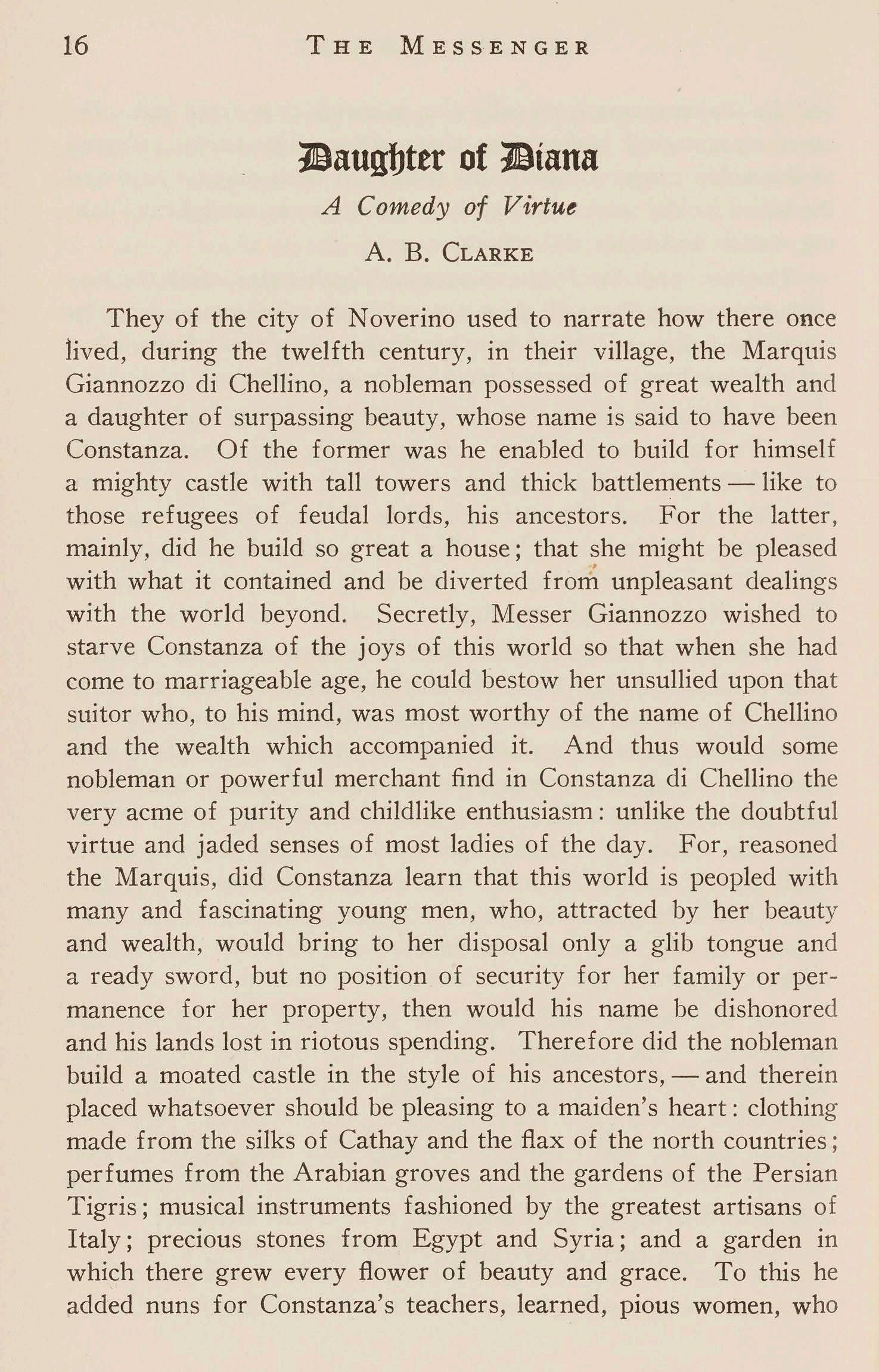
A. B. CLARKE
They of the city of N overino used to narrate how there on ce lived, during the twelfth century, in their village , the Marqui s Giannozzo di Chellino , a nobleman possessed of great wealth an d a daughter of surpassing beauty, whose name is said to have bee n Constanza. Of the former was he enabled to build for himse lf a mighty castle with tall towers and thick battlements -like t o those refugees of feudal lords, his ancestors. For the latte r, mainly, did he build so great a house; that she might be please d with what it contained and be diverted from unpleasant dealin gs with the world beyond. Secretly , Messer Giannozzo wished t o starve Constanza of the joys of this world so that when she ha d come to marriageable age, he could bestow her unsullied upon tha t suitor who, to his mind, was most worthy of the name of Chellin o and the wealth which accompanied it. And thus would som e nobleman or powerful merchant find in Constanza di Chellino th e very acme of purity and childlike enthusiasm : unlike the doubtfu l virtue and jaded senses of most ladies of the day . For , reasone d the Marquis , did Constanza learn that this world is peopled with many and fascinating young men, who, attracted by her beaut y and wealth , would bring to her disposal only a glib tongue an d a read y sword, but no position of security for her family or permanence for her property, then would his name be dishonore d and his lands lost in riotous spending. Therefore did the noblema n build a moated castle in the style of his ancestors, -and therei n placed whatsoever should be pleasing to a maiden's heart: clothin g made from the silks of Cathay and the flax of the north countrie s; perfumes from the Arabian groves and the gardens of the Persi an Tigris; musical instruments fashioned by the greatest artisans o f Italy; precious stones from Egypt and Syria; and a garden in which there grew every flower of beauty and grace. To this he added nuns for Constanza's teachers, learned, pious women , wh o

taught her principles of chastity gleaned from the frenzied study of the lives of the saints, their temptations, and their final place in Heaven and in the Church. Realizing at the command of Messer Giannozzo, that there was need to have the beautiful Constanza protected from the evils of this world, the good sisters ardently set themselves to the task of training the young girl to recognize and thus avoid the sins of the flesh against that time when she should marry a worthy suitor : much in the manner of later times.
In the evening, while the lovely Constanza walked in her garden among roses and lilies and strange buds, which knew no name in the sweet Italian tongue, Sister Amalthea read from the life of St. Catherine, who , through the power of her virginity, was enabled to confound eleven learned doctors in Alexandria; and of Saint Agnes, whose chastity was so great that she sacrificed a higher position in Heaven, and refused to minister to aged, penniless men who were blind and diseased, lest her presence inspire them with thoughts of their youth and of the women they had loved and then forsaken. And Constanza , on whom the bloom of youth had descended with rare and generous good-willso that her hair fell in black clouds about her shoulders, and no rose petal could equal the softness and rosy tint of her cheeks, nor precious gems surpass the deep-lined brilliance of her eyes,Constanza, maid of seventeen summers , marveled at the virtues of the ancient saints, and asked that the good sisters tell her more concerning the way toward favor in the sight of the good Lord and the Virgin.
There came a time, however, when Constanza, fired by the story of the martyrs of the Church, and responding to the seclusion of her unconscious imprisonment, sought to enter holy orders , to become a nun devout and pious, - to win immortal sainthood like those women of old. And concerning this desire she spoke to Messer Giannozzo in the manner following :
"Gracious father, I have tired of swishing silks and ethereal perfutnes, - my flowers fade and die, -my life becomes too much that of repetition. Grant me, I pray you, one great favor , and I shall ask for nothing more."
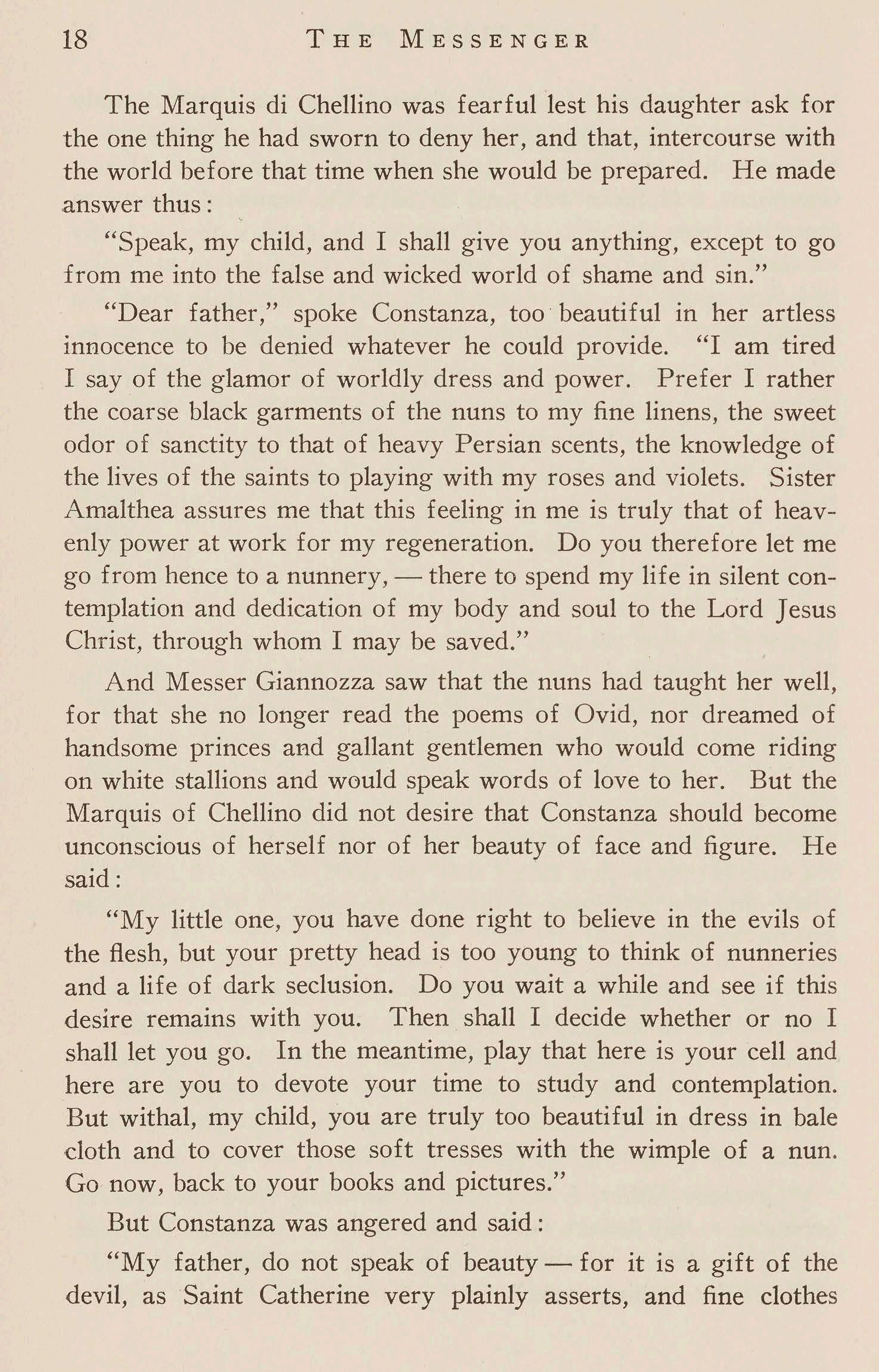
The Marquis di Chellino was fearful lest his daughter ask for the one thing he had sworn to deny her, and that, intercourse with the world before that time when she would be prepared. He made answer thus :
"Speak, my child, and I shall give you anything, except to go from me into the false and wicked world of shame and sin."
"Dear father," spoke Constanza, too beautiful in her artless innocence to be denied whatever he could provide. "I am tired I say of the glamor of worldly dress and power. Prefer I rather the coarse black garments of the nuns to my fine linens, the sweet odor of sanctity to that of heavy Persian scents, the knowledge of the lives of the saints to playing with my roses and violets. Sister Amal th ea assures me that this feeling in me is truly that of heavenly power at work for my regeneration. Do you therefore let me go from hence to a nunnery , - there to spend my life in silent contemplation and dedication of my body and soul to the Lord Jesus Christ, through whom I may be saved ."
And Messer Giannozza saw that the nuns had taught her well , for that she no longer read the poems of Ovid, nor dreamed of handsome princes and gallant gentlemen who would come riding on white stallions and would speak words of love to her. But the Marquis of Chellino did not desire that Constanza should become unconscious of herself nor of her beauty of face and figure. He said:
"My little one, you have done right to believe in the evils of the flesh, but your pretty head is too young to think of nunneries and a life of dark seclusion. Do you wait a while and see if this desire remains with you. Then shall I decide whether or no I shall let you go. In the meantime, play that here is your cell and here are you to devote your time to study and contemplation . But withal, my child, you are truly too beautiful in dress in bale doth and to cover those soft tresses with the wimple of a nun . Go now, back to your books and pictures."
But Constanza was angered and said :
"My father, do not speak of beauty-for it is a gift of the devil, as Saint Catherine very plainly asserts, and fine clothes
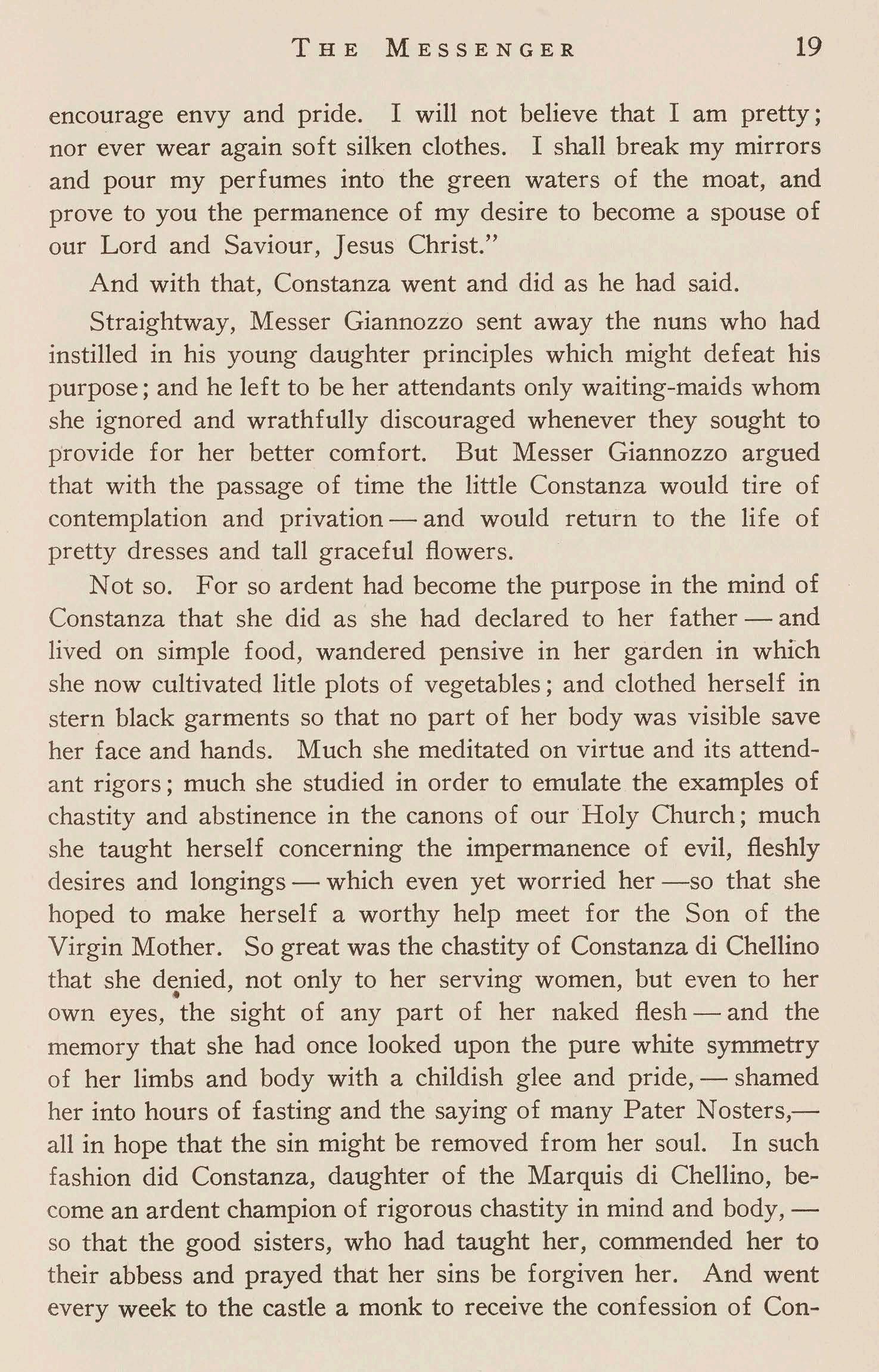
encourage envy and pride. I will not believe that I am pretty; nor ever wear again soft silken clothes. I shall break my mirrors and pour my perfumes into the green waters of the moat, and prove to you the permanence of my desire to become a spouse of our Lord and Saviour, Jesus Christ."
And with that, Constanza went and did as he had said.
Straightway, Messer Giannozzo sent away the nuns who had instilled in his young daughter principles which might def eat his purpose; and he left to be her attendants only waiting-maids whom she ignored and wrathfully discouraged whenever they sought to provide for her better comfort. But Messer Giannozzo argued that with the passage of time the little Constanza would tire of contemplation and privation - and would return to the life of pretty dresses and tall graceful flowers.
Not so. For so ardent had become the purpose in the mind of Constanza that she did as she had declared to her father - and lived on simple food, wandered pensive in her garden in which she now cultivated litle plots of vegetables ; and clothed herself in stern black garments so that no part of her body was visible save her face and hands. Much she meditated on virtue and its attendant rigors; much she studied in order to emulate the examples of chastity and abstinence in the canons of our Holy Omrch; much she taught herself concerning the impermanence of evil, fleshly desires and longings - which even yet worried her -so that she hoped to make herself a worthy help meet for the Son of the Virgin Mother. So great was the chastity of Constanza di Chellino that she denied, not only to her serving women, but even to her • own eyes, the sight of any part of her naked flesh - and the memory that she had once looked upon the pure white symmetry of her limbs and body with a childish glee and pride, - shamed her into hours of fasting and the saying of many Pater Nosters,all in hope that the sin might be removed from her soul. In such fashion did Constanza, daughter of the Marquis di Chellino, become an ardent champion of rigorous chastity in mind and body,so that the good sisters, who had taught her, commended her to their abbess and prayed that her sins be forgiven her. And went every week to the castle a monk to receive the confession of Con-

stanza; and the good father marvelled at the magnitude of the young gentlewoman's sins and her repentance ; and he studied the harder to be able to be worthy of such saintly confession; and in all he was made a better man for it.
Now the people of N overino further relate that, in the city of Florence, there lived a young man known as Ghino di Tacco,a youngster who respected neither the Church nor the wisdom of his elders; and who lived a life of swordplay and tavern brawling; - a roustabout, but, withal, a man of principle who never doubted that right would prevail when backed by a facile wit, a slender rapier, a firm wrist and a sure foot. In the spirit of the time, he extemporized love verses and delivered them with fatal effect upon the daughters of inn-keepers and artisans, for that he had little opportunity to converse with ladies of higher station. He heard of Constanza di Chellino, and how her father was saving her for a wealthy suitor of established family who should receive infinite wealth as a dowry. Also, he heard of the piety and profound study and the unquestioned virtue of the maiden, together with the story of her beauty-which was said to be that of autumn sunsets view from mountain heights. And Ghino was troubled : no maid of any considerable beauty should be made to spend her life in such a manner. Finally, on a wager, he determined to go to N overino and see this maiden whose reputation was that of undoubted continence and indifference to the manifold joys of this world.
Therefore, in the due course of time, Ghino di Tacco came to the castle of Messer Giannozzo and looked across the moat at a vine-covered wall which surrounded a garden. .The young man hesitated between bravely approaching the entrance and demanding admittance, and crossing the moat and climbing the wall. Of the two, the latter seemed the simplest and the one promising the most success. With this decision in mind, Ghino ran to the nearby wood and cut a young pine tree, from which he removed all the branches. Then the bare trunk he dragged to the moat and placed
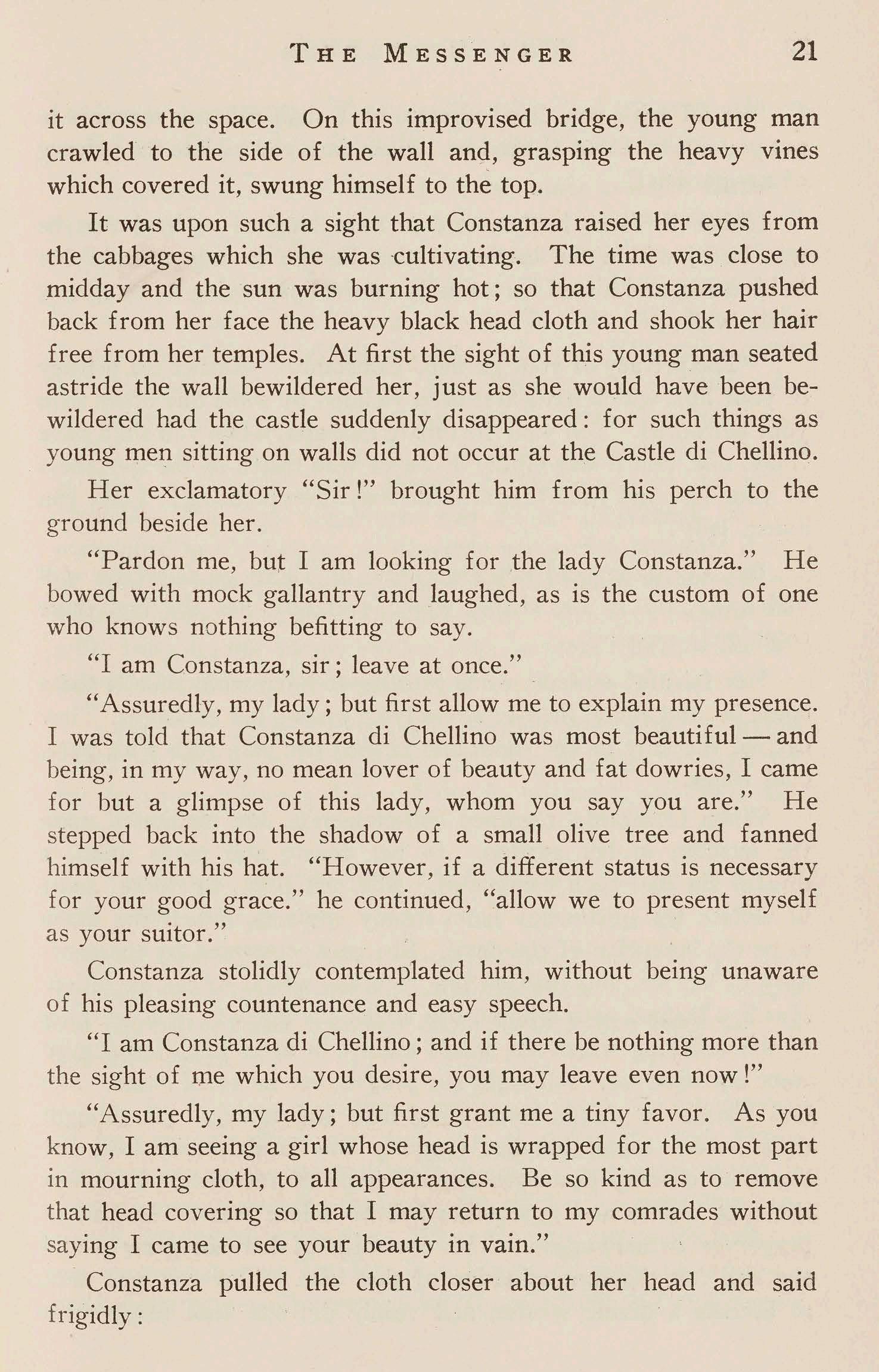
it across the space. On this improvised bridge, the young man crawled to the side of the wall and, grasping the heavy vines which covered it, swung himself to the top.
It was upon such a sight that Constanza raised her eyes from the cabbages which she was cultivating. The time was close to midday and the sun was burning hot; so that Constanza pushed back from her face the heavy black head cloth and shook her hair free from her temples. At first the sight of this young man seated astride the wall bewildered her, just as she would have been bewildered had the castle suddenly disappeared : for such things as young men sitting on walls did not occur at the Castle di Chellino.
Her exclamatory "Sir!" brought him from his perch to the g round beside her.
"Pardon me, but I am looking for the lady Constanza." He bowed with mock gallantry and laughed, as is the custom of one who know s n othing befitting to say.
"I am Constanza, sir; leave at once."
"Assuredly, my lady; but first allow me to explain my presence. I was told that Constanza di Chellino was most beautiful - and being, in my way, no mean lover of beauty and fat dowries, I came fo r but a glimpse of this lady, whom you say you are." He stepped back into the shadow of a small olive tree and fanned himself with his hat. "However, if a different status is necessary for your good grace." he continued, "allow we to present myself as your suitor."
Constanza stolidly contemplated him, without being unaware o f his pleasing countenance and easy speech.
"I am Constanza di Chellino; and if there be nothing more than t he sight of me which you desire, you may leave even now!"
"Assuredly, my lady; but first grant me a tiny favor. As you k now, I am seeing a girl whose head is wrapped for the most part in mourning cloth, to all appearances. Be so kind as to remove t hat head covering so that I may return to my comrades without saying I came to see your beauty in vain."
Constanza pulled the cloth closer about her head and said fr igidly:
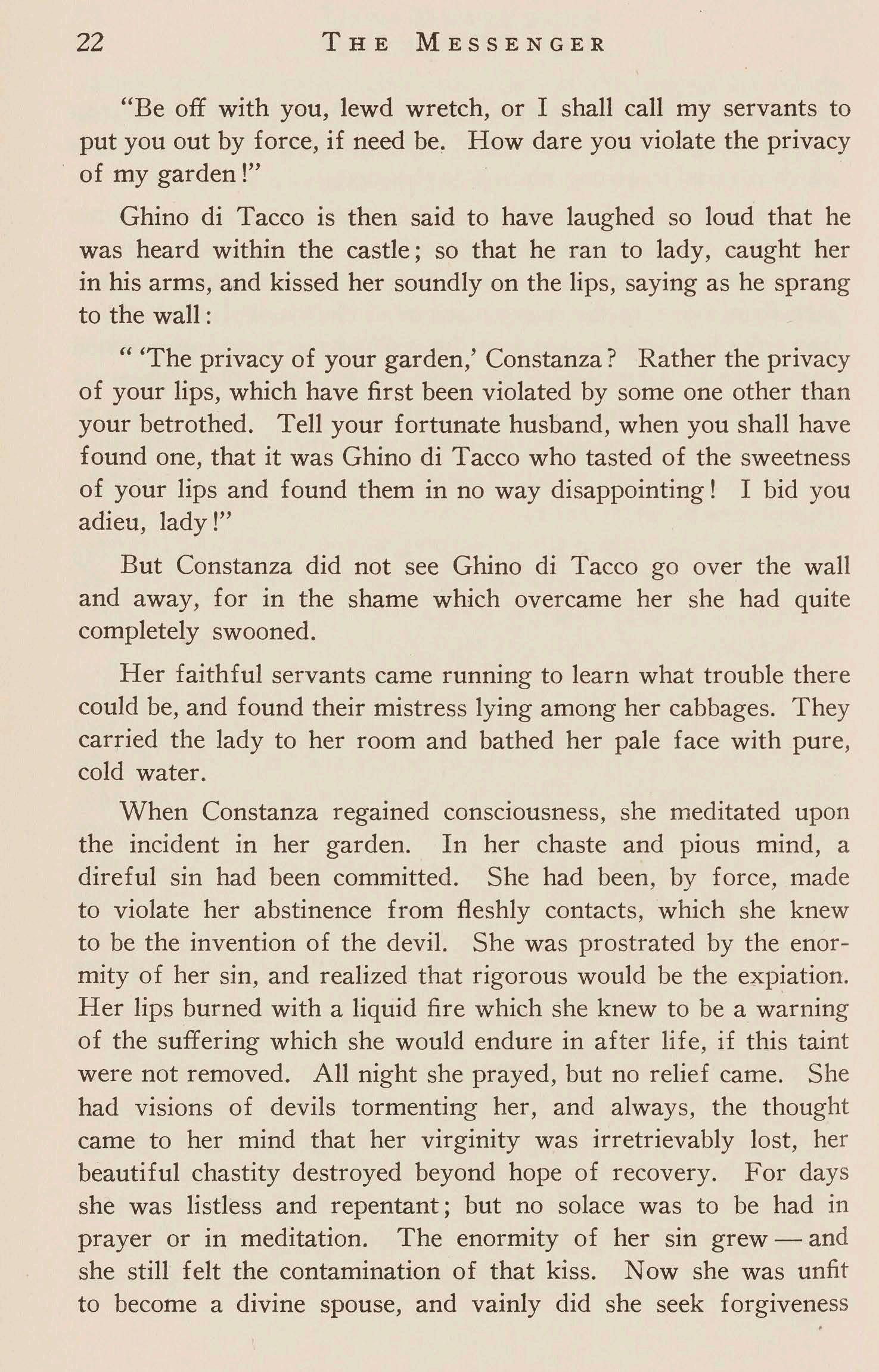
"Be off with you, lewd wretch, or I shall call my servants to put you out by force, if need be, How dare you violate the privacy of my garden!"
Ghino di Tacco is then said to have laughed so loud that he was heard within the castle; so that he ran to lady, caught her in his arms, and kissed her soundly on the lips, saying as he sprang to the wall:
" 'The privacy of your garden,' Constanza? Rather the privacy of your lips, which have first been violated by some one other than your betrothed. Tell your fortunate husband, when you shall have found one, that it was Ghino di Tacco who tasted of the sweetness of your lips and found them in no way disappointing! I bid you adieu, lady!"
But Constanza did not see Ghino di Tacco go over the wall and away, for in the shame which overcame her she had quite completely swooned.
Her faithful servants came running to learn what trouble there could be, and found their mistress lying among her cabbages. They carried the lady to her room and bathed her pale face with pure, cold water.
When Constanza regained consciousness, she meditated upon the incident in her garden. In her chaste and pious mind, a direful sin had been committed. She had been, by force, made to violate her abstinence from fleshly contacts, which she knew to be the invention of the devil. She was prostrated by the enormity of her sin, and realized that rigorous would be the expiation. Her lips burned with a liquid fire which she knew to be a warning of the suffering which she would endure in after life, if this taint were not removed. All night she prayed, but no relief came. She had visions of devils tormenting her, and always, the thought came to her mind that her virginity was irretrievably lost, her beautiful chastity destroyed beyond hope of recovery. For days she was listless and repentant; but no solace was to be had in prayer or in meditation. The enormity of her sin grew -and she still felt the contamination of that kiss. Now she was unfit to become a divine spouse, and vainly did she seek forgiveness

for her misadventure. She knew that the devil had sent this man to deflower her and to force her into eternal damnation.
Constanza turned to the lives of the saints to find a method of recovering her lost virginity, but they gave her no advice. She· found the story of Saint Margaret, who, when on a pilgrimage to the tomb of Jesus, had to cross a wide and deep stream. The ferryman asked of her passage money, but she had none, and in desperation offered herself to the boatman. Thus was proven her heavenly spirit since that she counted self the least of all her possessions -and sought communion with the divine hosts which are ever to be found in the tomb of the Lord and Saviour. In such fashion did Saint Margaret become one of the first of Heaven. But alas, Constanza was on no pilgrimage, and had exchanged her virtue for no heavenly gift-but had sent it away on the foul lips of an adventurer -so Constanza fasted and wept scalding tears. But she found no peace. Her eyes became heavy with weeping, her throat swolen with her sobs; and all the while it seemed a coal of fire was burning on her lips.
One night, after four days of fasting and countless prayers, Constanza had a heavenly vision. She saw an angel coming toward her bearing a glowing flame of fire in his hand, and he spoke to her and said :
"Constanza, wouldst thou be purified of this sin which thou hast committed?"
And when Constanza cried out that she would give her life to be cleansed; then the angel placed the flame upon her lips, and t he fire burned and scorched them so that they were pure and unsullied again.
In the morning, Constanza meditated upon the interpretation of her vision, which was sent her as direction from Heaven. Straightway, when she had, with the aid of reference to the lives of the saints, found the meaning, she procured a large iron poker, which she placed in the fire. When the iron was white with heat, she pressed it upon her lips in a frenzy of pious hope, and felt intolerable pain as the flaming metal seared her red and beautiful
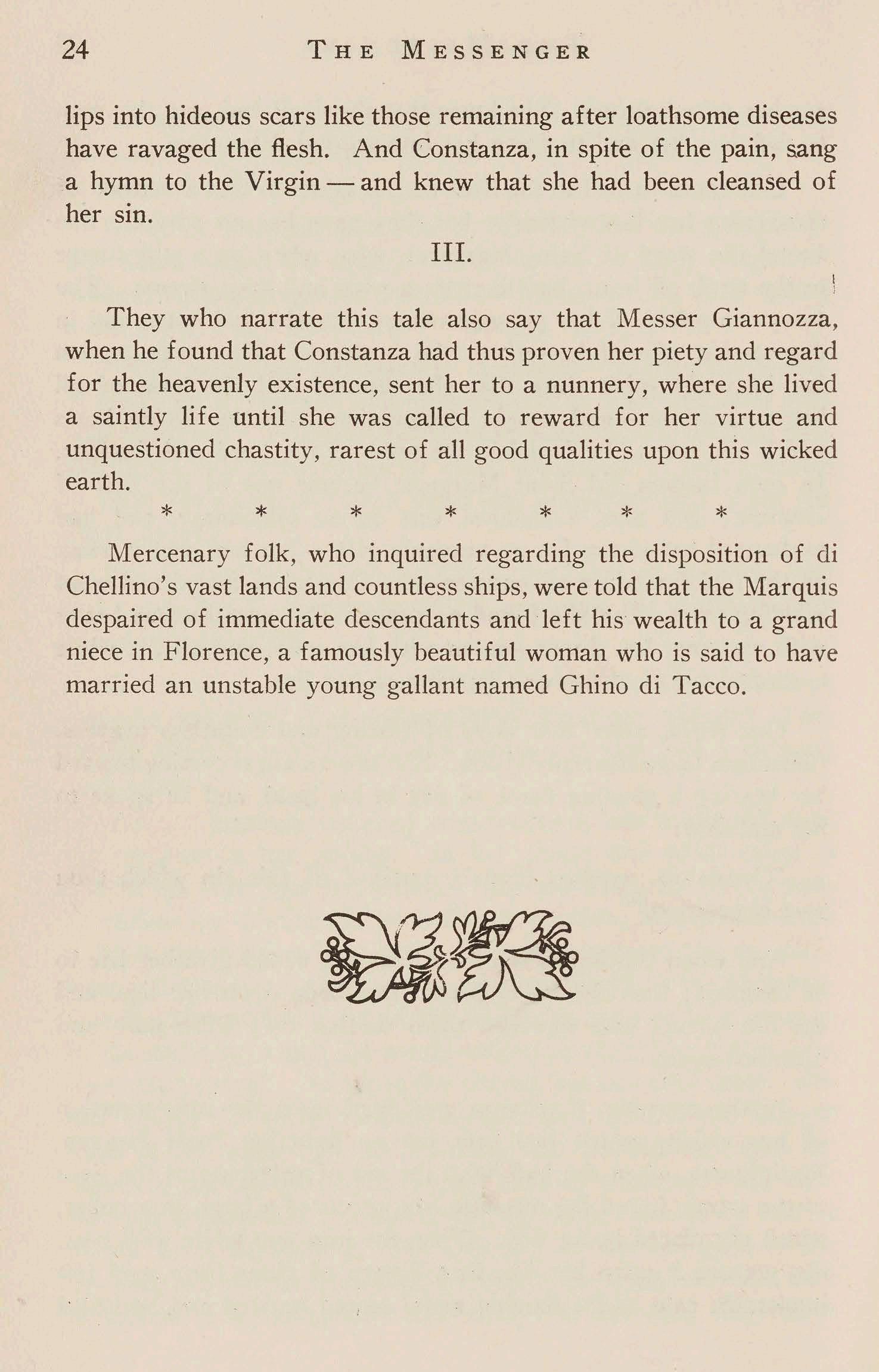
lips into hideous scars like those remaining after loathsome diseases have ravaged the flesh. And Constanza, in spite of the pain, sang a hymn to the Virgin -and knew that she had been cleansed of her sin.
III.
They who narrate this tale also say that Messer Giannozza , when he found that Constanza had thus proven her piety and regard for the heavenly existence, sent her to a nunnery, where she lived a saintly life until she was called to reward for her virtue and unquestioned chastity, rarest of all good qualities upon this wicked earth.
Mercenary folk, who inquired regarding the disposition of di Chellino's vast lands and countless ships, were told that the Marqui s despaired of immediate descendants and left his wealth to a gran d niece in Florence , a famously beautiful woman who is said to hav e married an unstable young gallant named Ghino di Tacco .
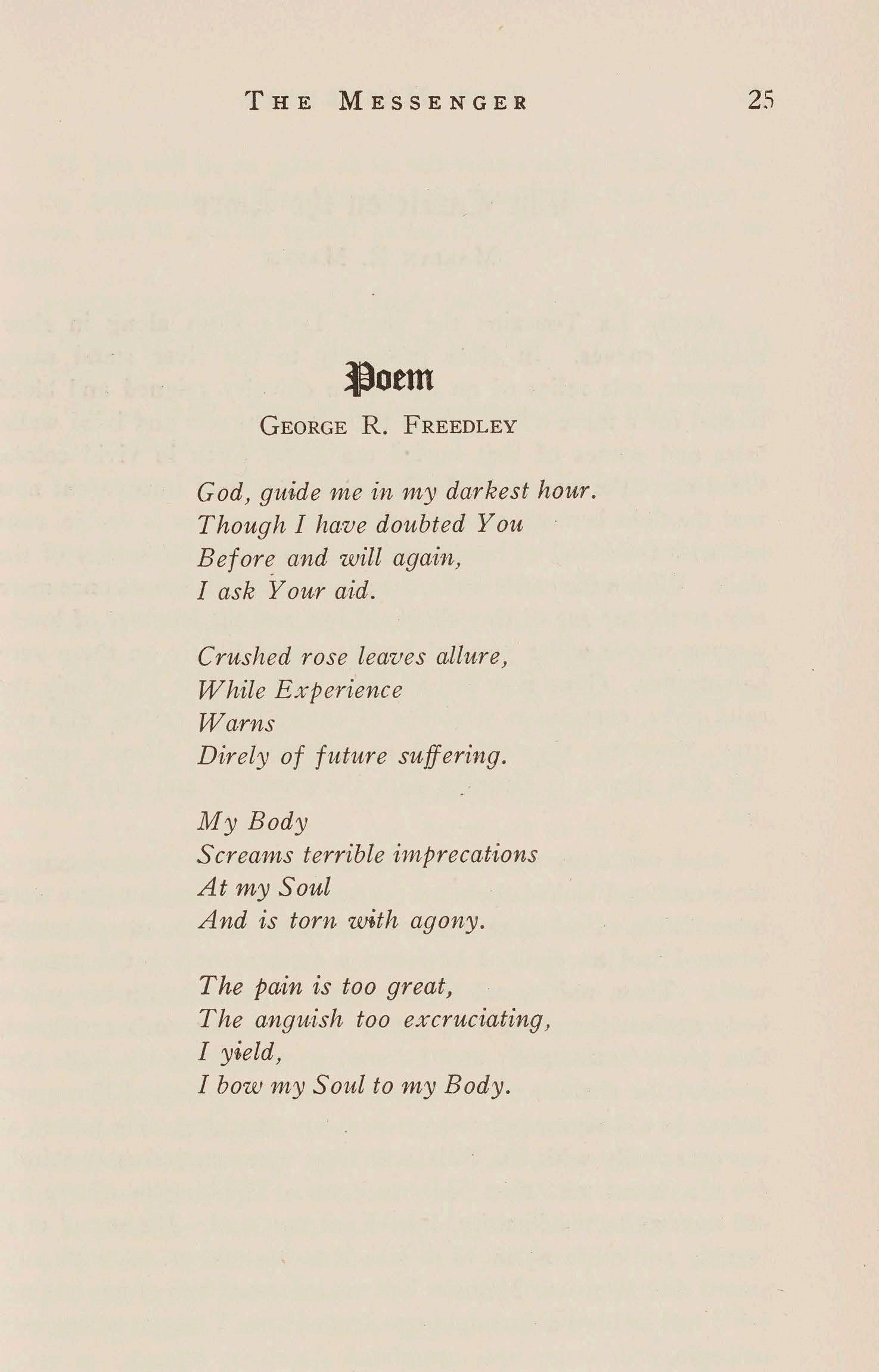
GEORGE R. FREEDLEY
God, guide me in my darkest hour. Though I have doubted You Befor~ and will again, I ask Your aid.
Crushed rose leaves allure, While Experience Warns Direly of future suffering. My Body Screams terrible imprecation s At my Soul And is torn with agony.
The pain is too great, The anguish too excruciating , I yield, I bow my Soul to my Body.
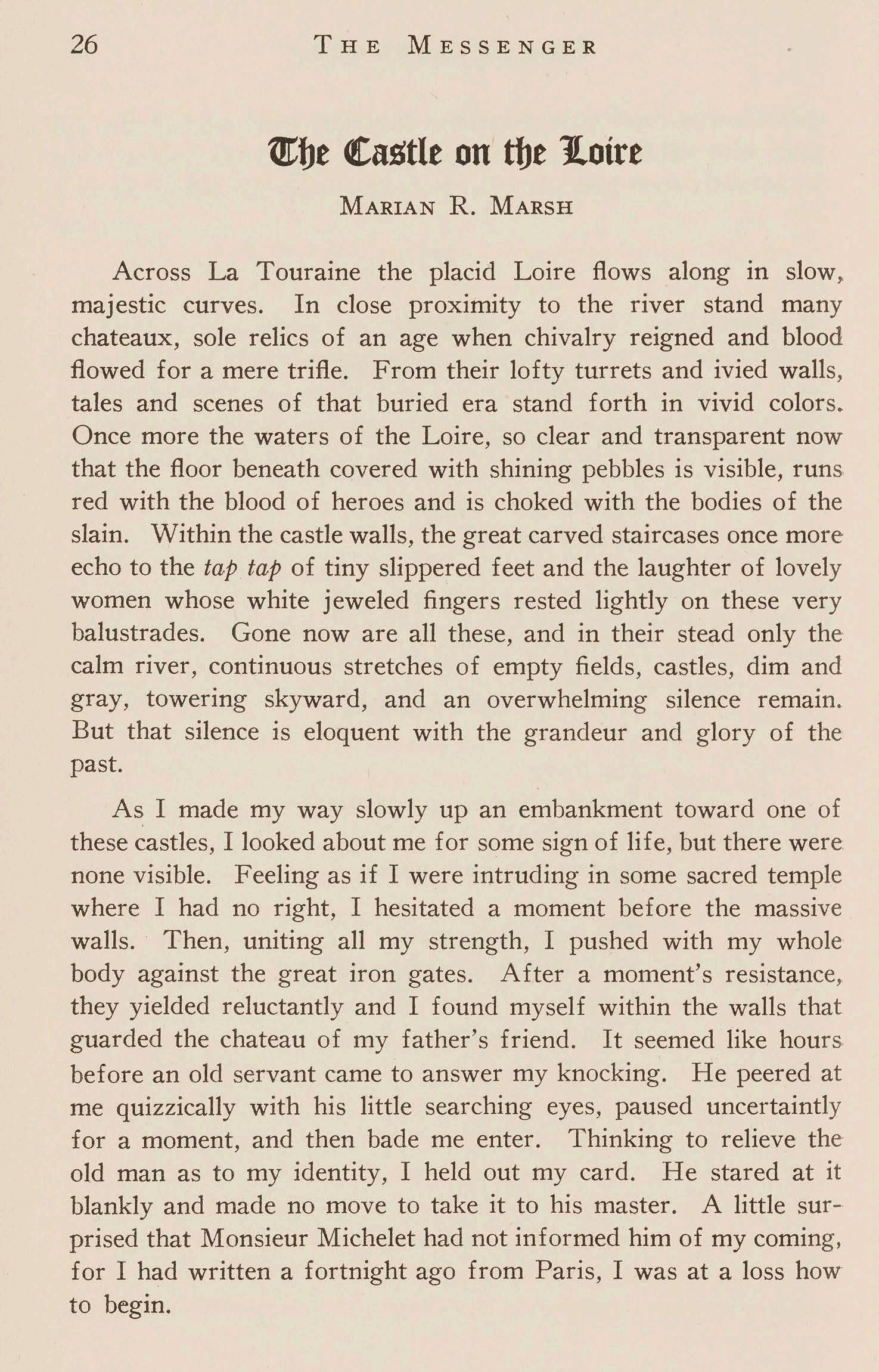
MARIAN R. MARSH
Across La Touraine the placid Loire flows along in slow , majestic curves. In close proximity to the river stand many chateaux, sole relics of an age when chivalry reigned and blood flowed for a mere trifle. From their lofty turrets and ivied walls , tales and scenes of that buried era stand forth in vivid colors . Once more the waters of the Loire, so clear and transparent now that the floor beneath covered with shining pebbles is visible, run s red with the blood of heroes and is choked with the bodies of the slain. Within the castle walls, the great carved staircases once more echo to the tap tap of tiny slippered feet and the laughter of lovely women whose white jeweled fingers rested lightly on these very balustrades. Gone now are all these, and in their stead only th e calm river, continuous stretches of empty fields, castles, dim and gray, towering skyward, and an overwhelming silence remain . But that silence is eloquent with the grandeur and glory of the past.
As I made my way slowly up an embankment toward one of these castles, I looked about me for some sign of life, but there were none visible. Feeling as if I were intruding in some sacred temple where I had no right, I hesitated a moment before the massiv e walls. Then, uniting all my strength, I pushed with my whole body against the great iron gates. After a moment's resistance , they yielded reluctantly and I found myself within the walls that guarded the chateau of my father's friend. It seemed like hour s before an old servant came to answer my knocking. He peered at me quizzically with his little searching eyes, paused uncertaintly for a moment, and then bade me enter. Thinking to relieve the old man as to my identity, I held out my card. He stared at it blankly and made no move to take it to his master. A little surprised that Monsieur Michelet had not informed him of my coming, for I had written a fortnight ago from Paris, I was at a loss how to begin.
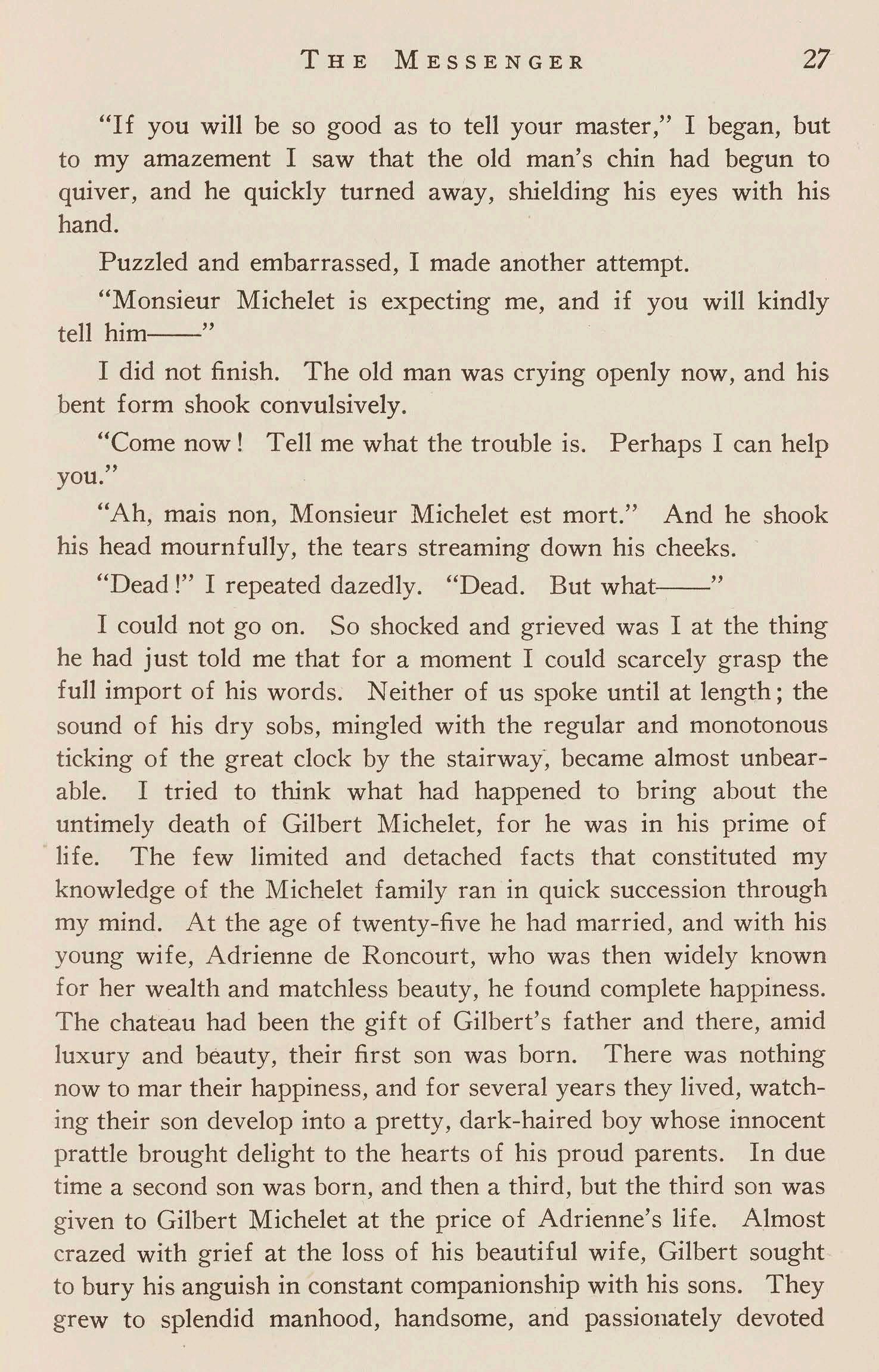
"If you will be so good as to tell your master," I began, but to my amazement I saw that the old man's chin had begun to quiver, and he quickly turned away, shielding his eyes with his hand.
Puzzled and embarrassed, I made another attempt.
"Monsieur Michelet is expecting me, and if you will kindly tell him--"
I did not finish. The old man was crying openly now, and his bent form shook convulsively.
"Come now! Tell me what the trouble is. Perhaps I can help you."
"Ah, mais non, Monsieur Michelet est mort." And he shook his head mournfully, the tears streaming down his cheeks.
"Dead!" I repeated dazedly. "Dead. But what--"
I could not go on. So shocked and grieved was I at the thing he had just told me that for a moment I could scarcely grasp the full import of his words. Neither of us spoke until at length; the sound of his dry sobs, mingled with the regular and monotonous ticking of the great clock by the stairway, became almost unbearable. I tried to think what had happened to bring about the untimely death of Gilbert Michelet, for he was in his prime of life. The few limited and detached facts that constituted my knowledge of the Michelet family ran in quick succession through my mind. At the age of twenty-five he had married, and with his young wife, Adrienne de Roncourt, who was then widely known for her wealth and matchless beauty, he found complete happiness. The chateau had been the gift of Gilbert's father and there, amid luxury and beauty, their first son was born. There was nothing now to mar their happiness, and for several years they lived, watching their son develop into a pretty, dark-haired boy whose innocent prattle brought delight to the hearts of his proud parents. In due time a second son was born, and then a third, but the third son was given to Gilbert Michelet at the price of Adrienne's life. Almost crazed with grief at the loss of his beautiful wife, Gilbert sought to bury his anguish in constant companionship with his sons. They grew to splendid manhood, handsome, and passionately devoted
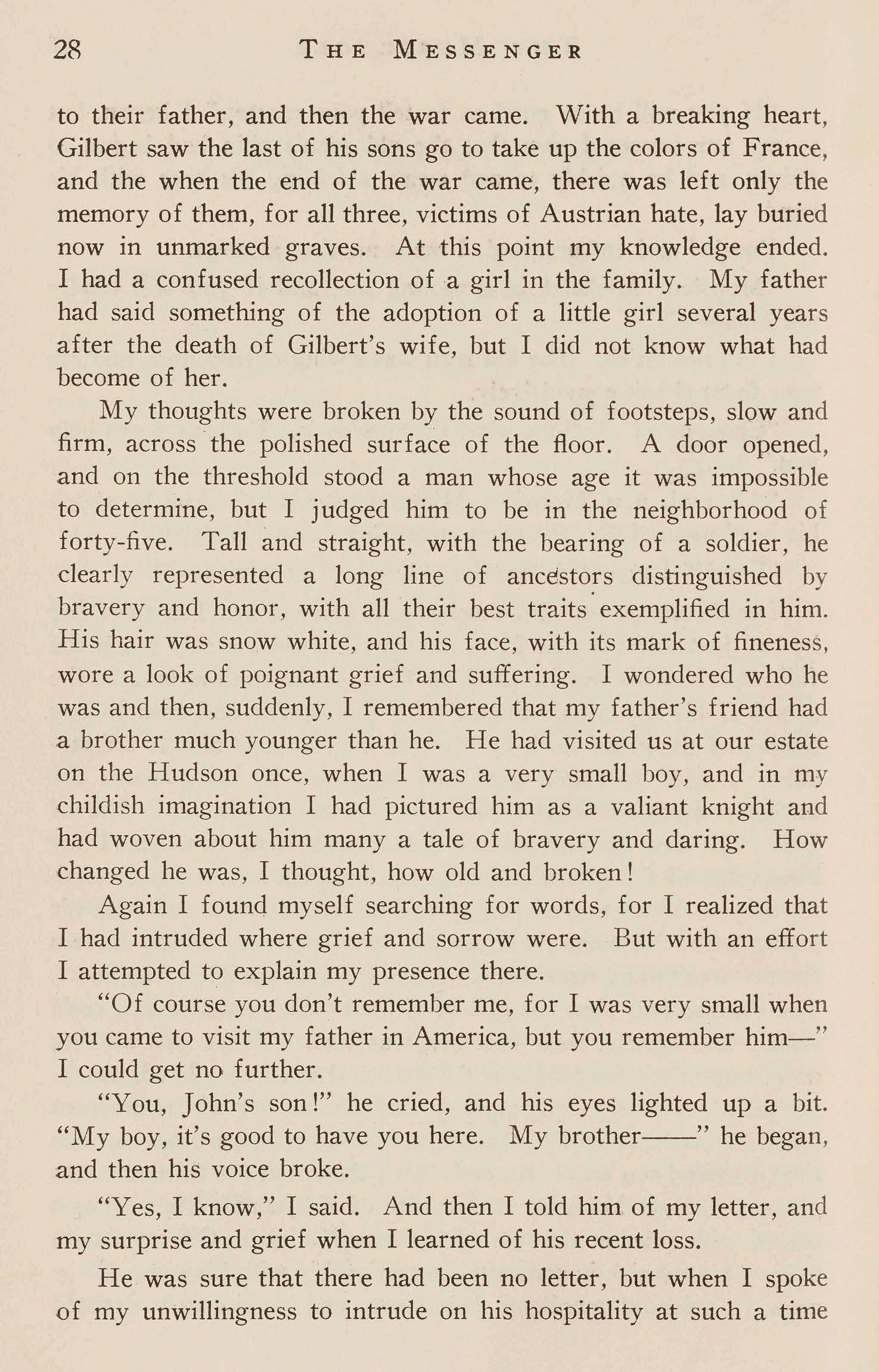
to their father, and then the war came. With a breaking heart , Gilbert saw the last of his sons go to take up the colors of France , and the when the end of the war came, there was left only th e memory of them, for all three, victims of Austrian hate, lay burie d now in unmarked graves. At this point my knowledge ended . I had a confused recollection of a girl in the family. My fathe r had said something of the adoption of a little girl several year s after the death of Gilbert's wife, but I did not know what ha d become of her.
My thoughts were broken by the sound of footsteps, slow an d firm, across the polished surface of the floor. A door opene d, and on the threshold stood a man whose age it was impossibl e to determine, but I judged him to be in the neighborhood of forty-five. Tall and straight, with the bearing of a soldier, h e clearl y represented a long line of ancestors distinguished by bravery and honor, with all their best traits· exemplified in him . His hair was snow white, and his face, with its mark of finenes s, wore a look of poignant grief and suffering. I wondered who h e was and then, suddenly, I remembered that my father's friend ha d a brother much younger than he. He had visited us at our estat e on the Hudson once , when I was a very small boy, and in my childish imagination I had pictured him as a valiant knight an d had woven about him many a tale of bravery and daring. Ho w changed he was , I thought, how old and broken!
Again I found myself searching for words , for I realized tha t I had intruded where grief and sorrow were. But with an effor t I attempted to explain my presence there.
"Of course you don't remember me, for I was very small whe n you came to visit my father in America, but you remember him- " I could get no further.
"You, John ' s son !" he cried, and his eyes lighted up a bit. "My boy, it's good to have you here. My brother--" he began , and then his voice broke.
"Yes, I know," I said. And then I told him of my letter, an d my surprise and grief when I learned of his recent loss.
He was sure that there had been no letter, but when I spok e of my unwillingness to intrude on his hospitality at such a tim e
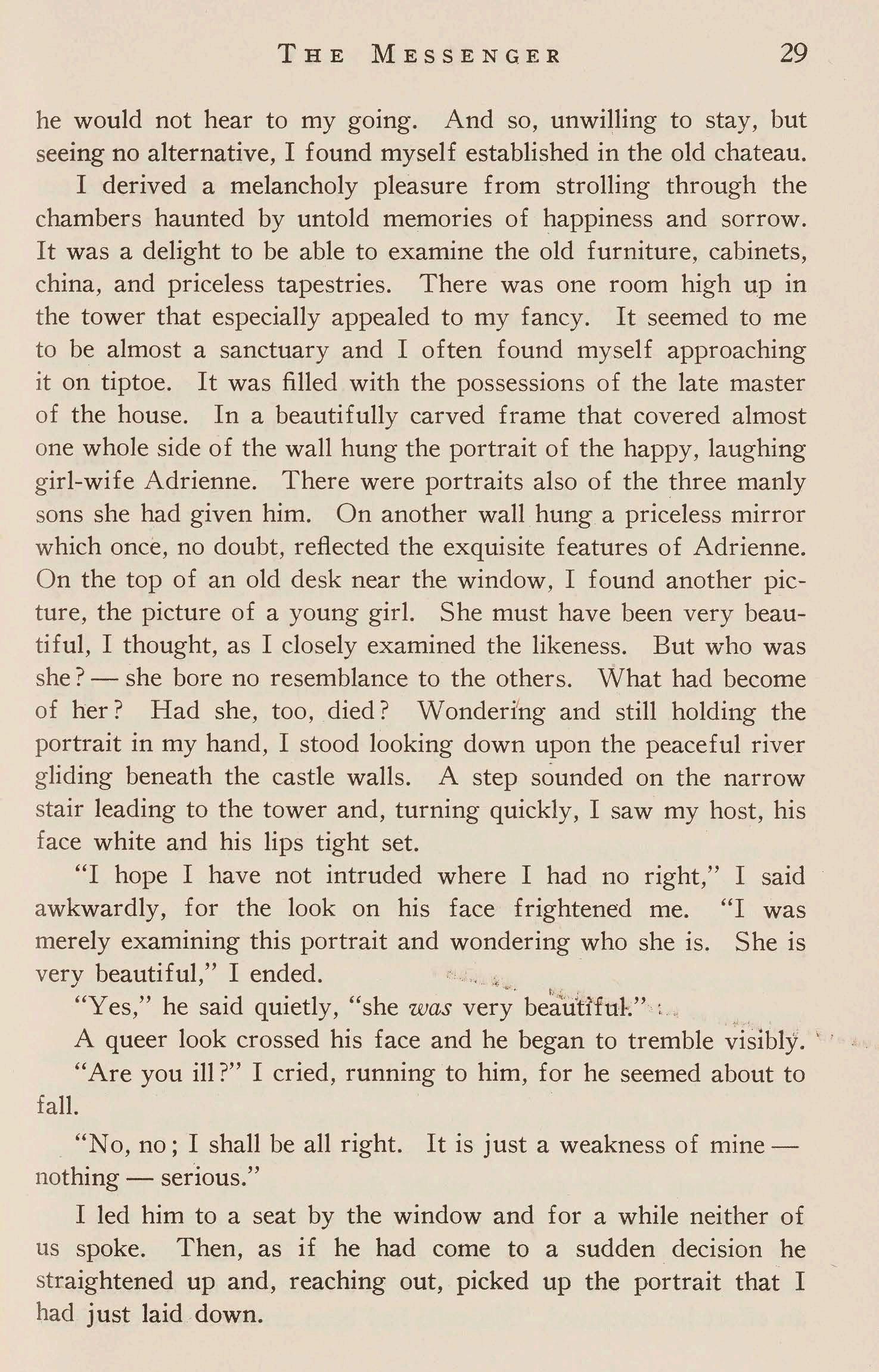
he would not hear to my going. And so, unwilling to stay , but seeing no alternative , I found myself established in the old chateau .
I derived a melancholy pleasure from strolling through the chambers haunted by untold memories of happine ss and sorrow . It was a delight to be able to examine the old furniture , cabinets, china, and priceless tapestries. There was one room high up in t he tower that especially appealed to my fancy. It seemed to me to be almost a sanctuary and I of ten found myself approaching it on tiptoe. It was filled with the possessions of the late master of the house. In a beautifully carved frame that covered almost one whole side of the wall hung the portrait of the happy , laughing g irl-wife Adrienne. There were portraits also of the three manly sons she had given him . On another wall hung a priceless mirror which once, no doubt, reflected the exquisite features of Adrienne . O n the top of an old desk near the window , I found another pict ure , the picture of a young girl. She must have been very beauti ful, I thought, a s I closely examined the likeness. But who was she? -she bore no resemblance to the others . What had become of her ? Had she, too, died? Wonder i'ng and still holding the portrait in my hand, I stood looking down upon the peaceful river gliding beneath the castle walls. A step sounded on the narrow stair leading to the tower and, turning quickly, I saw my host , hi s fa ce white and his lips tight set.
"I hope I have not intruded where I had no right ," I said a wkwardly, for the look on his face frightened me. "I was merely examining this portrait and wondering who she is . She is very beautiful, " I ended. " .
"Yes," he said quietly, "she was ver y bei utHuJ.." : . . .
A queer look crossed his face and he began to tremble visibl y . · ·
"Are you ill?" I cried, running to him , for he seemed about to fa ll.
"No, no; I shall be all right. It is just a weakness of minenothing -serious."
I led him to a seat by the window and for a while neither of us spoke. Then, as if he had come to a sudden decision he str aightened up and, reaching out, picked up the portrait that I ha d just laid down.
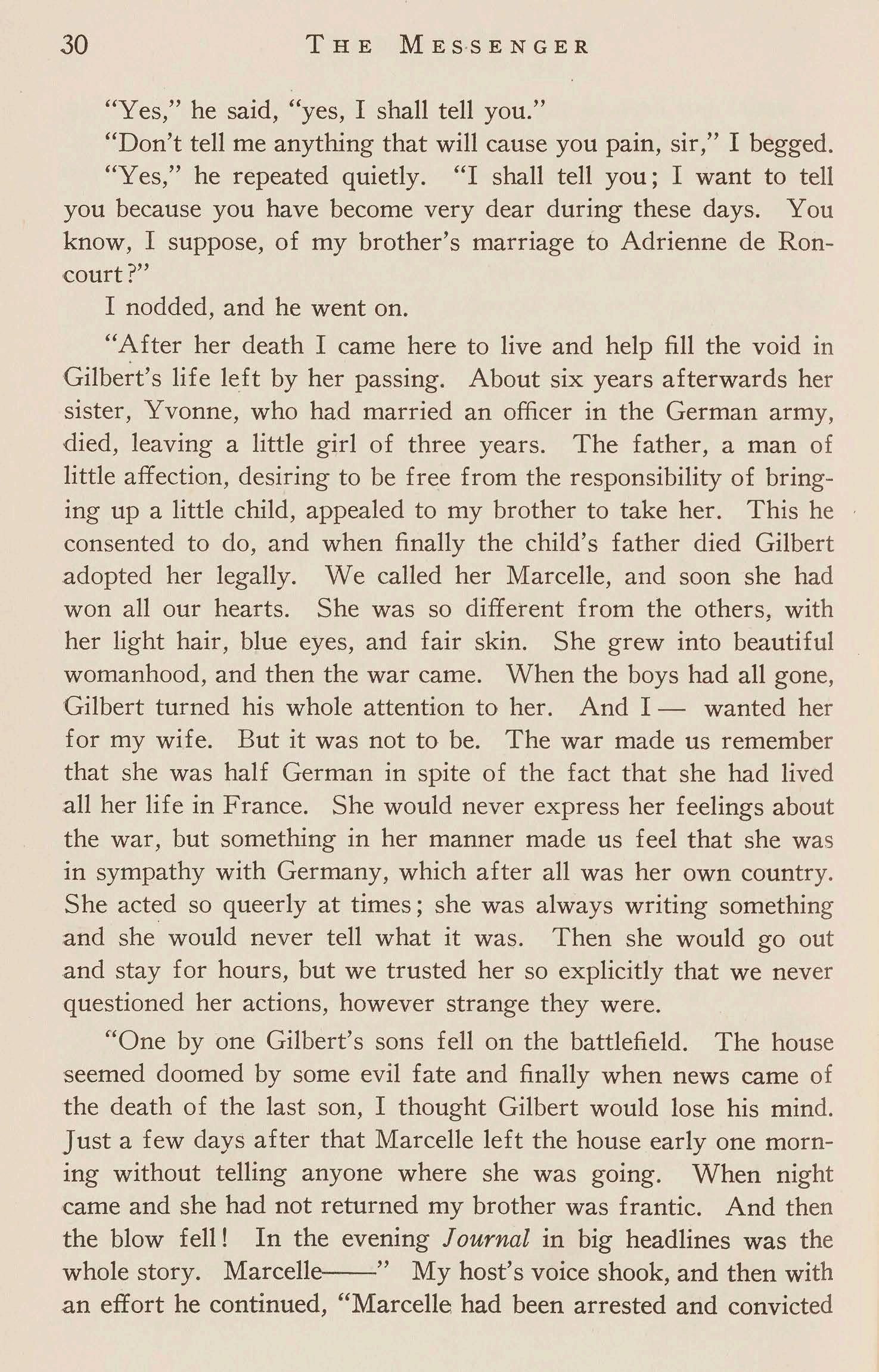
"Yes," he said, "yes, I shall tell you."
"Don't tell me anything that will cause you pain, sir," I begged . "Yes," he repeated quietly. "I shall tell you; I want to tell you because you have become very dear during these days. You know, I suppose, of my brother's marriage to Adrienne de Roncourt ?"
I nodded, and he went on.
"After her death I came here to live and help fill the void in Gilbe~t's life left by her passing. About six years afterwards he r sister, Yvonne, who had married an officer in the German arm y, died, leaving a little girl of three years. The father, a man o f little affection , desiring to be free from the responsibility of brin ging up a little child, appealed to my brother to take her. This h e consented to do , and when finally the child's father died Gilber t adopted her legally. We called her Marcelle, and soon she ha d won all our hearts. She was so different from the others, with her light hair, blue eyes, and fair skin. She grew into beautifu l womanhood, and then the war came. When the boys had all gone , Gilbert turned his whole attention to her. And I -wanted he r for my wife. But it was not to be. The war made us remember that she was half German in spite of the fact that she had lived all her life in France. She would never express her feelings abou t the war, but something in her manner made us feel that she wa s in sympathy with Germany, which after all was her own country . She acted so queerly at times; she was always writing somethin g and she would never tell what it was. Then she would go out and stay for hours, but we trusted her so explicitly that we neve r questioned her actions, however strange they were.
"One by one Gilbert's sons fell on the battlefield. The hou se seemed doomed by some evil fate and finally when news came of the death of the last son, I thought Gilbert would lose his mind. Just a few days after that Marcelle left the house early one morning without telling anyone where she was going. When night came and she had not returned my brother was frantic. And then the blow fell ! In the evening Journal in big headlines was th e whole story. Marcelle--" My host's voice shook, and then with an effort he continued, "Marcelle had been arrested and convicted
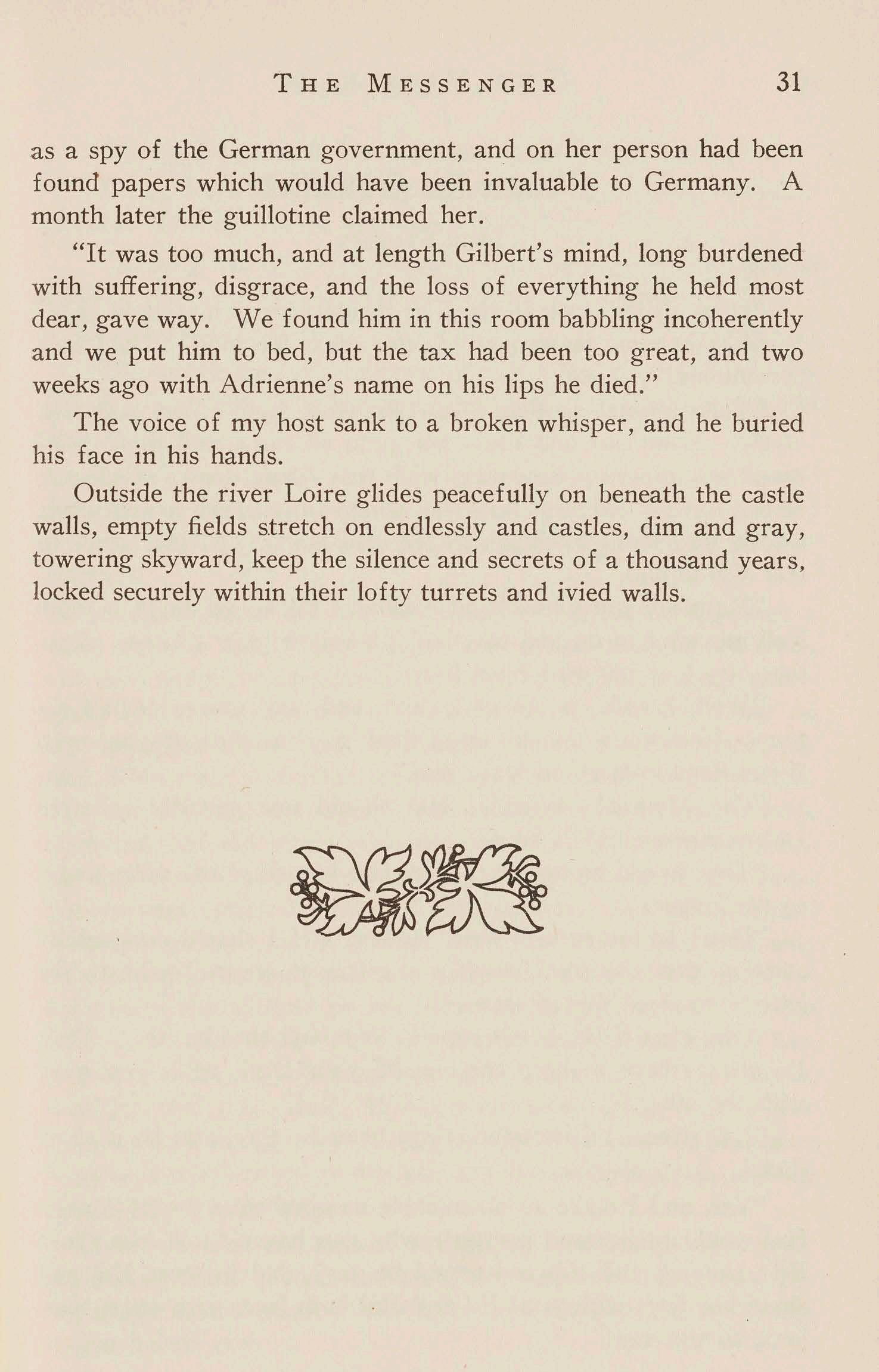
as a spy of the German government, and on her person had been found papers which would have been invaluable to Germany. A month later the guillotine claimed her.
"It was too much, and at length Gilbert's mind, long burdened with suffering, disgrace, and the loss of everything he held most dear, gave way. We found him in this room babbling incoherently and we put him to bed, but the tax had been too great, and two weeks ago with Adrienne's name on his lips he died."
The voice of my host sank to a broken whisper, and he buried his face in his hands.
Outside the river Loire glides peacefully on beneath the castle walls, empty fields stretch on endlessly and castles, dim and gray, towering skyward, keep the silence and secrets of a thousand years, locked securely within their lofty turrets and ivied walls.
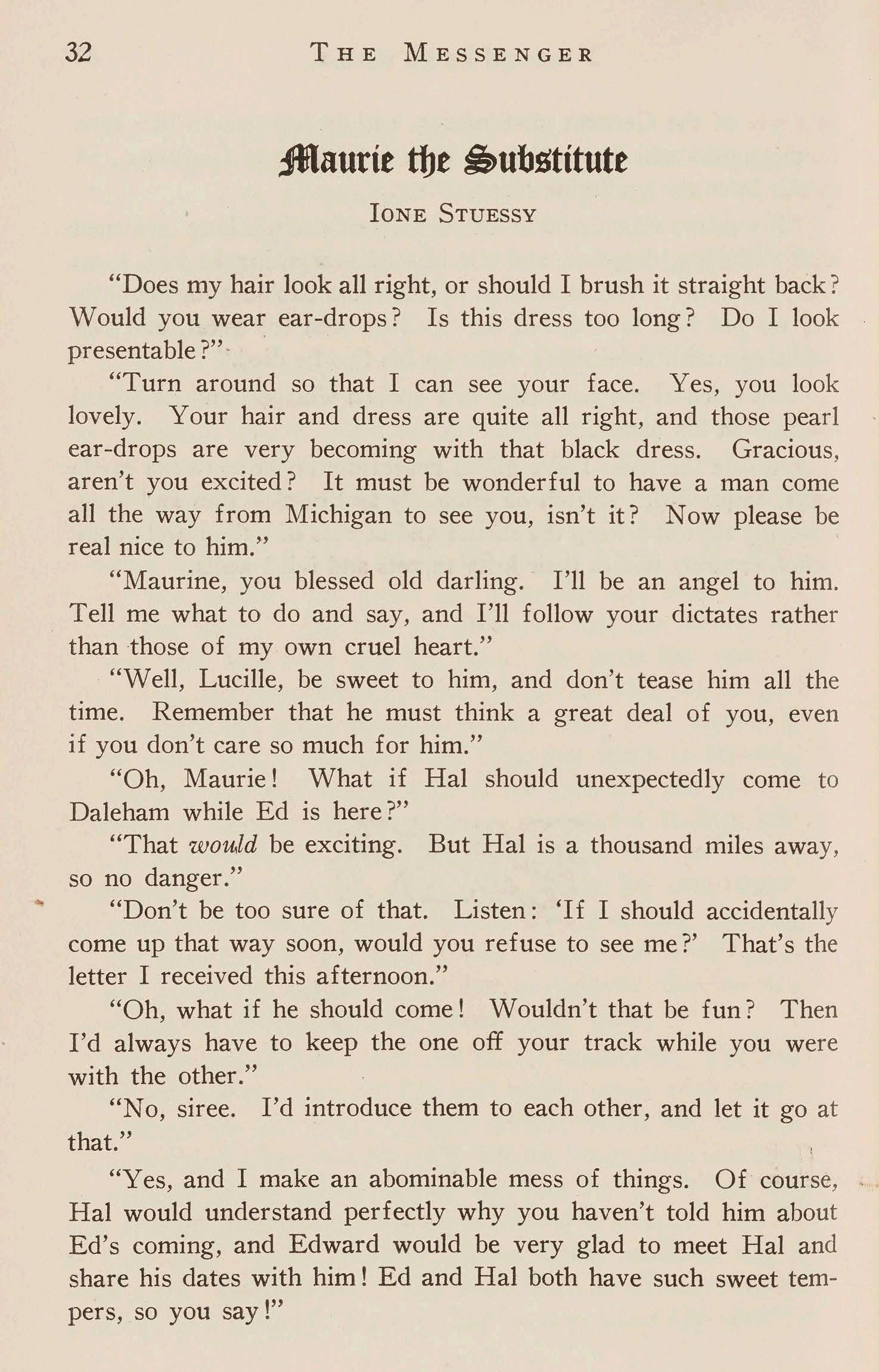
loNE STUESSY
"Does my hair look all right , or should I brush it straight back ? Would you wear ear-drops? Is this dress too long? Do I look presentable?" - ·
"Turn around so that I can see your face. Yes, y ou look lovely. Your hair and dress are quite all right , and those pearl ear-drops are very becoming with that black dress. Graciou s, aren't you excited? It must be wonderful to have a man come all the way from Michigan to see you , isn't it? Now please be real nice to him."
"Maurine, you blessed old darling. I'll be an angel to him . Tell me what to do and say, and I'll follow your dictates rath er than those of my own cruel heart."
"Well , Lucille , be sweet to him, and don't tease him all th e time . Remember that he must think a great deal of you, even if you don ' t care so much for him."
"Oh , Maurie! What if Hal should unexpectedly come to Daleham while Ed is here? "
"That would be exciting. But Hal is a thousand miles awa y, so no danger."
"Don't be too sure of that. Listen: 'If I should accidentall y come up that way soon, would you refuse to see me?' That's th e letter I received this afternoon."
"Oh, what if he should come! Wouldn't that be fun ? Th en I'd always have to keep the one off your track while you were with the other."
"No, siree. I'd introduce them to each other, and let it go at that."
"Yes, and I make an abominable mess of things. Of cours e, Hal would understand perfectly why you haven't told him abo ut Ed's coming, and Edward would be very glad to meet Hal a nd share his dates with him! Ed and Hal both have such sweet tempers, so you say!"
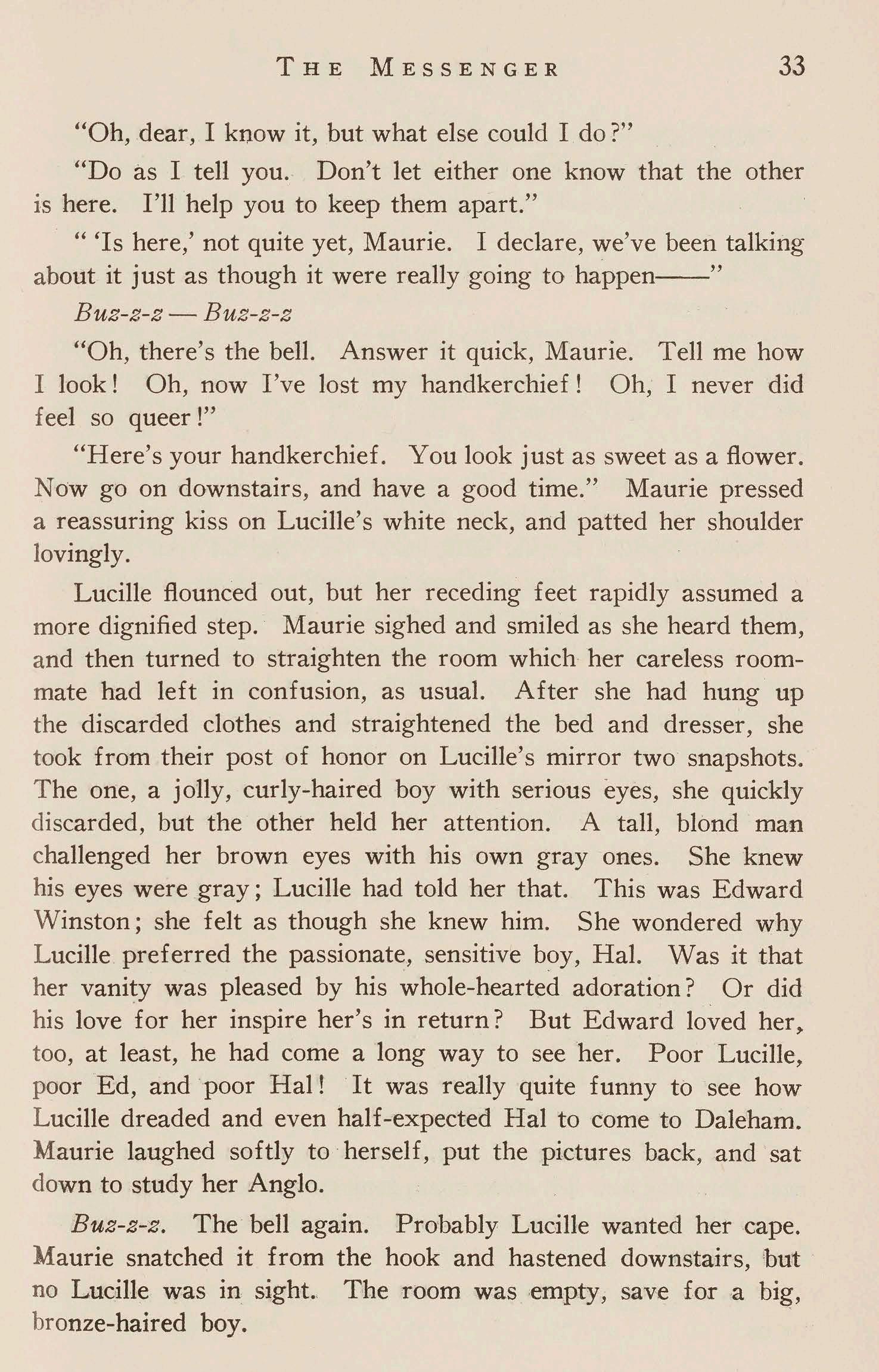
"Oh, dear, I know it, but what else could I do? "
"Do as I tell you. Don't let either one know that the other is here. I'll help you to keep them apart."
" 'Is here,' not quite yet, Maurie . I declare , we ' ve been talkin g about it just as though it were really going to happen--"
Buz-z-z - Buz-z-z
"Oh, there's the bell. Answer it quick, Maurie . Tell me how I look ! Oh, now I've lost my handkerchief ! Oh, I never did f eel so queer!"
"Here ' s your handkerchief. You look just a s sweet as a flower . N ow go on downstairs , and have a good time. " Maurie pressed a reassuring kiss on Lucille' s white neck, and patted her shoulder lovingly.
Lucille flounced out, but her receding feet rapidly assumed a m ore dignified step. Maurie sighed and smiled as she heard them, a nd then turned to straighten the room which her careless roommate had left in confusion, as usual. After she had hung up t he discarded clothes and straightened the bed and dresser , she to ok from their post of honor on Lucille's mirror two snapshots . T he one , a jolly, curly-haired boy with serious eyes , she quickly dis carded, but the other held her attention. A tall , blond man challenged her brown eyes with his own gray ones. She knew h is eyes were gray; Lucille had told her that . This was Edward W inston; she felt as though she knew him. She wondered why L ucille preferred the passionate, sensitive boy, Hal. Was it that her vanity was pleased by his whole-hearted adoration? Or did his love for her inspire her' s in return? But Edward lo~ed her . to o, at least, he had come a long way to see her. Poor Lucille , poor Ed, and poor Hal! It was really quite funny to see how L ucille dreaded and even half-expected Hal to come to Daleham. Maurie laughed softly to herself, put the pictures back , and sat down to study her Anglo.
Buz-z-z. The bell again. Probably Lucille wanted her cape . Maurie snatched it from the hook and hastened downstairs, but no Lucille was in sight. . The room was empty, save for a big , bronze-haired boy.
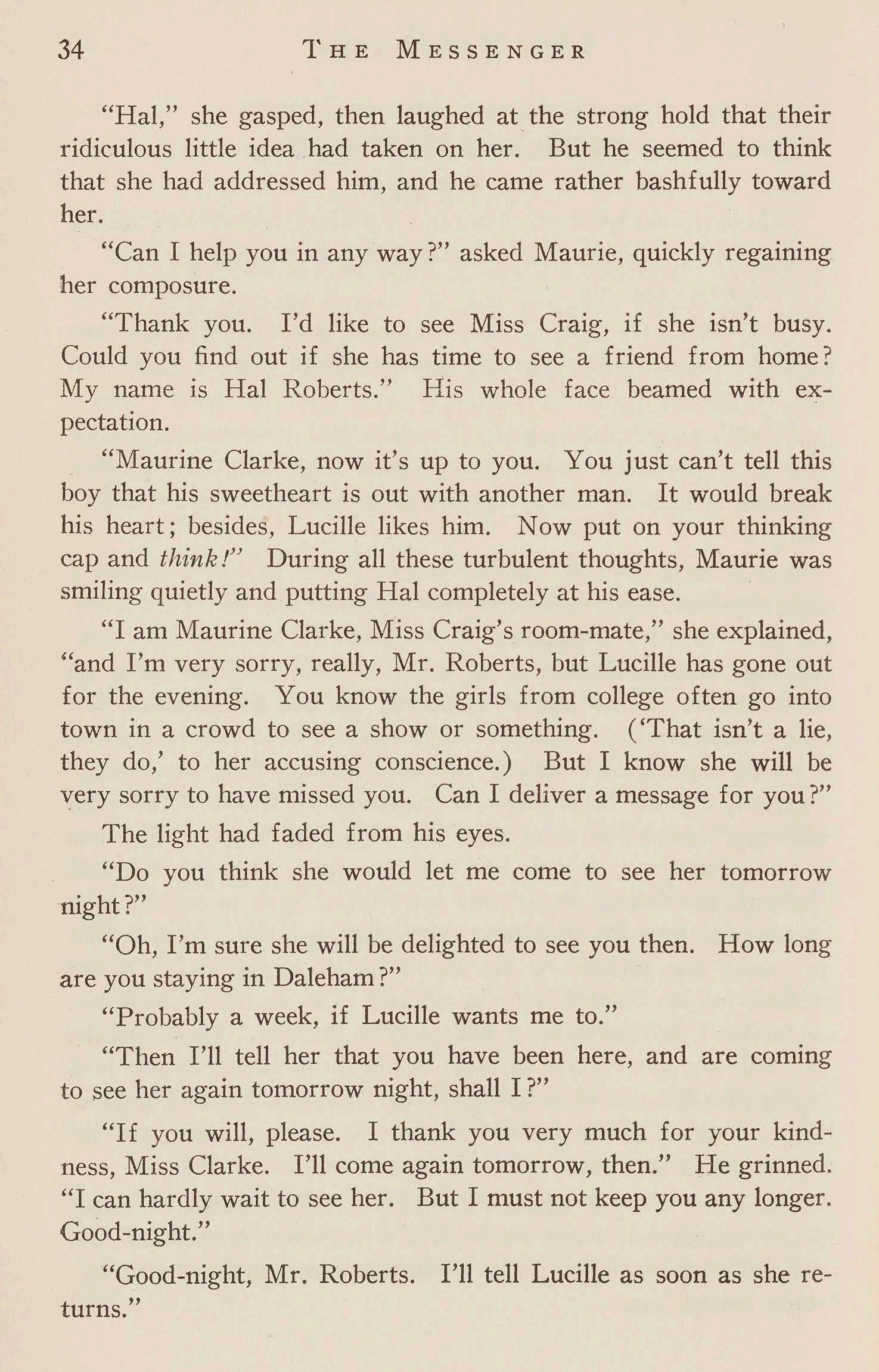
"Hal," she gasped, then laughed at the strong hold that their ridiculous little idea had taken on her. But he seemed to think that she had addressed him, and he came rather bashfully toward her.
"Can I help you in any way?" asked Maurie, quickly regaining her composure.
"Thank you. I'd like to see Miss Craig, if she isn't busy. Could you find out if she has time to see a friend from home ? My name is Hal Roberts." His whol e face beamed with e:ispectation.
"Maurine Clarke, now it's up to you. You just can't tell this boy that his sweetheart is out with another man. It would break his heart; besides, Lucille likes him. Now put on your thinking cap and think! " During all these turbulent thoughts, Maurie was smiling quietly and putting Hal completely at his ease.
"I am Maurine Clarke, Miss Craig's room-mate," she explained, "and I'm very sorry, really, Mr. Roberts, but Lucille has gone out for the evening . You know the girls from college often go into town in a crowd to see a show or something. ('That isn 't a lie , they do,' to her accusing conscience.) But I know she will be very sorry to have missed you. Can I deliver a message for you?"
The light had faded from his eyes.
"Do you think she would let me come to see her tomorrow night?"
"Oh, I'm sure she will be delighted to see you then. How long are you staying in Daleham ?"
"Probably a week, if Lucille wants me to."
"Then I'll tell her that you have been here, and are coming to see her again tomorrow night, shall I?"
"If you will, please. I thank you very much for your kindness, Miss Clarke. I'll come again tomorrow, then." He grinned . "I can hardly wait to see her. But I must not keep you any longer . Good-night."
"Good-night, Mr. Roberts. I'll tell Lucille as soon as she returns."
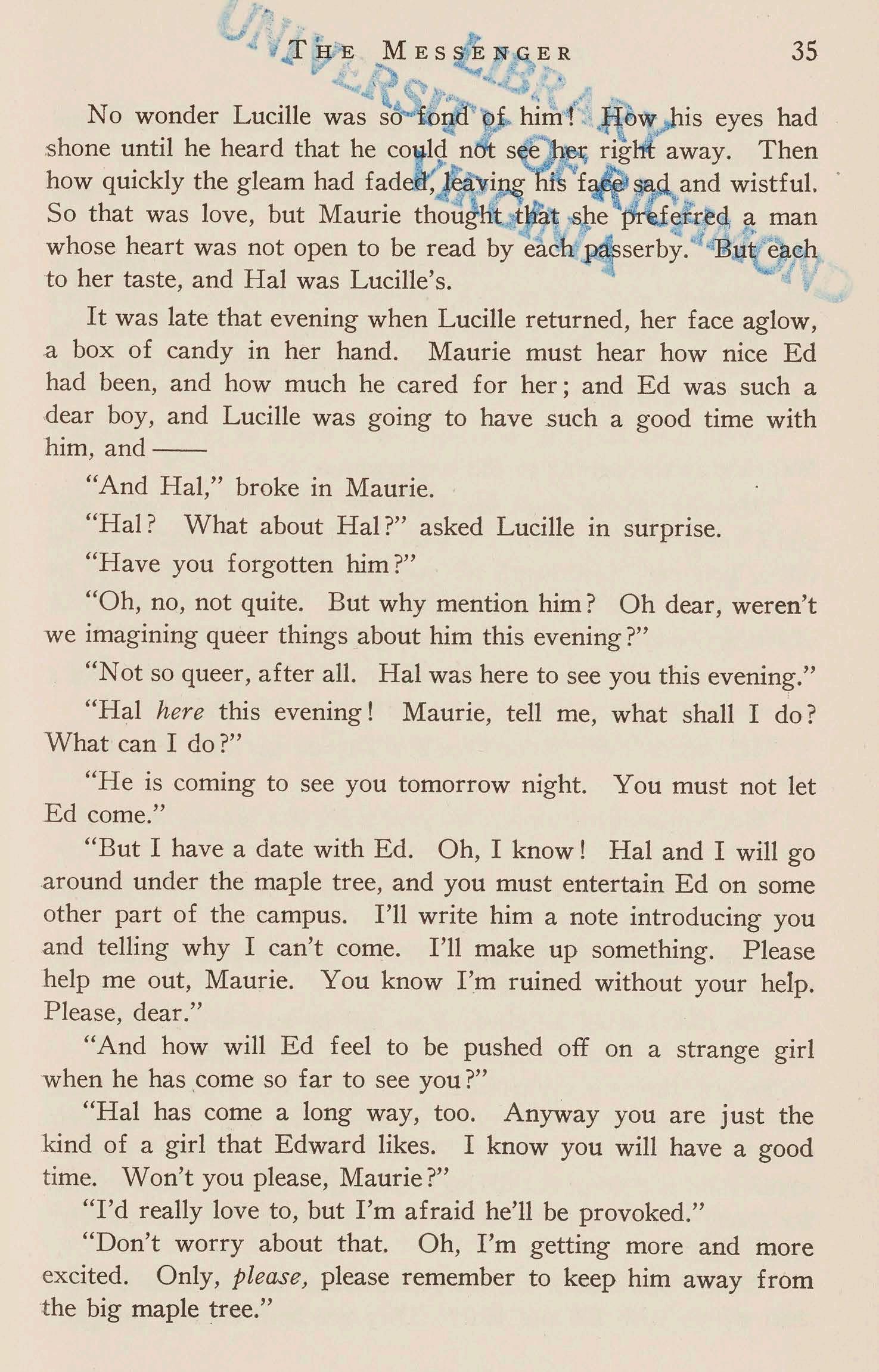
No wonder Lucille was s~- £:o~d" •\i!f. him ( , ow his eyes had shone until he heard that he co~l<Jn s e right away. Then how quickly the gleam had fade d'; e;1i ~ is f · r,d.t~-nd wistful. So that was love, but Maurie thouglit t $t t s,9e p¾.fet..rhl, ~ . man whose heart was not open to be read by each _pa'};serby. t.,Rut e4ch to her taste, and Hal was Lucille's.
It was late that evening when Lucille returned, her face aglow, .a box of candy in her hand. Maurie must hear how nice Ed had been, and how much he cared for her ; and Ed was such a dear boy, and Lucille was going to have such a good time with him, and--
"And Hal," broke in Maurie.
"Hal? What about Hal?" asked Lucille m surprise.
"Have you forgotten him?"
"Oh, no, not quite. But why mention him? Oh dear, weren't we imagining queer things about him this evening ?"
"Not so queer, after all. Hal was here to see you this evening."
"Hal here this evening! Maurie, tell me, what shall I do? What can I do ?"
"He is coming to see you tomorrow night. You must not let Ed come."
"But I have a date with Ed. Oh, I know! Hal and I will go around under the maple tree, and you must entertain Ed on some other part of the campus. I'll write him a note introducing you and telling why I can't come. I'll make up something. Please help me out, Maurie. You know I'm ruined without your help. Please, dear."
"And how will Ed feel to be pushed off on a strange girl when he has .come so far to see you?"
"Hal has come a long way, too. Anyway you are just the kind of a girl that Edward likes. I know you will have a good time. Won't you please, Maurie?"
"I'd really love to, but I'm afraid he'll be provoked."
"Don't worry about that. Oh, I'm getting more and more excited. Only, please, please remember to keep him away from the big maple tree."

"All right, we'll take the swing in back. Oh, that was second light-flash. Hurry, or you will have to undress in the dark."
"No danger, I'm in bed now. Good night. I'm so excited I can hardly sleep."
The girls returned to their room at about the same time the next evening, and, girl-fashion, carried on whispered confidences late into the evening. Lucille's flushed and happy face told its own story of a lovely evening, and Maurie's sparkling eyes suggested a similar tale.
"Well, does Hal still worship you as much as ever?" laughed Maurice, as an opening to the conversation.
"Maurice, please don't make fun of Hal. He's a sweet boy , and I really do like him. I'm glad he likes me so much, too, so there, you may just laugh all you please. I'll still be just as fond of him. Besides, he's jollier than Ed. Ed is always so afraid of letting loose and showing his feelings."
"I don't think he's too reserved one bit," with heat, "I like a boy to be like that. But do you really care for Hal?"
"Of course, I do. I don't see how anyone can keep from loving him."
"But," in muffled tones, "do you really like him -better than Ed?"
"Oh, I don't know, but I suppose I do. Maybe, it's because he likes me better than Ed does."
Maurie caught her breath. "Why I thought you said that Ed told you that he was in love with you."
"He did, but all he needs is to fall in love to find out how mistaken he is about loving me. But Hal's different--"
Maurie threw a sympathetic arm about her little room-mate, and they cuddled close together in their tiny bed. Lucille slept peacefully, happily, dreaming dreams of love returned tenfold . Maurie did not sleep, but daringly allowed a few tiny hopes to fill her thoughts -and when she finally fell asleep, her dreams were bolder still.
"Now," said Lucille the next afternoon, "the question is, what shall we do with Ed and Hal? They are both coming tonight."
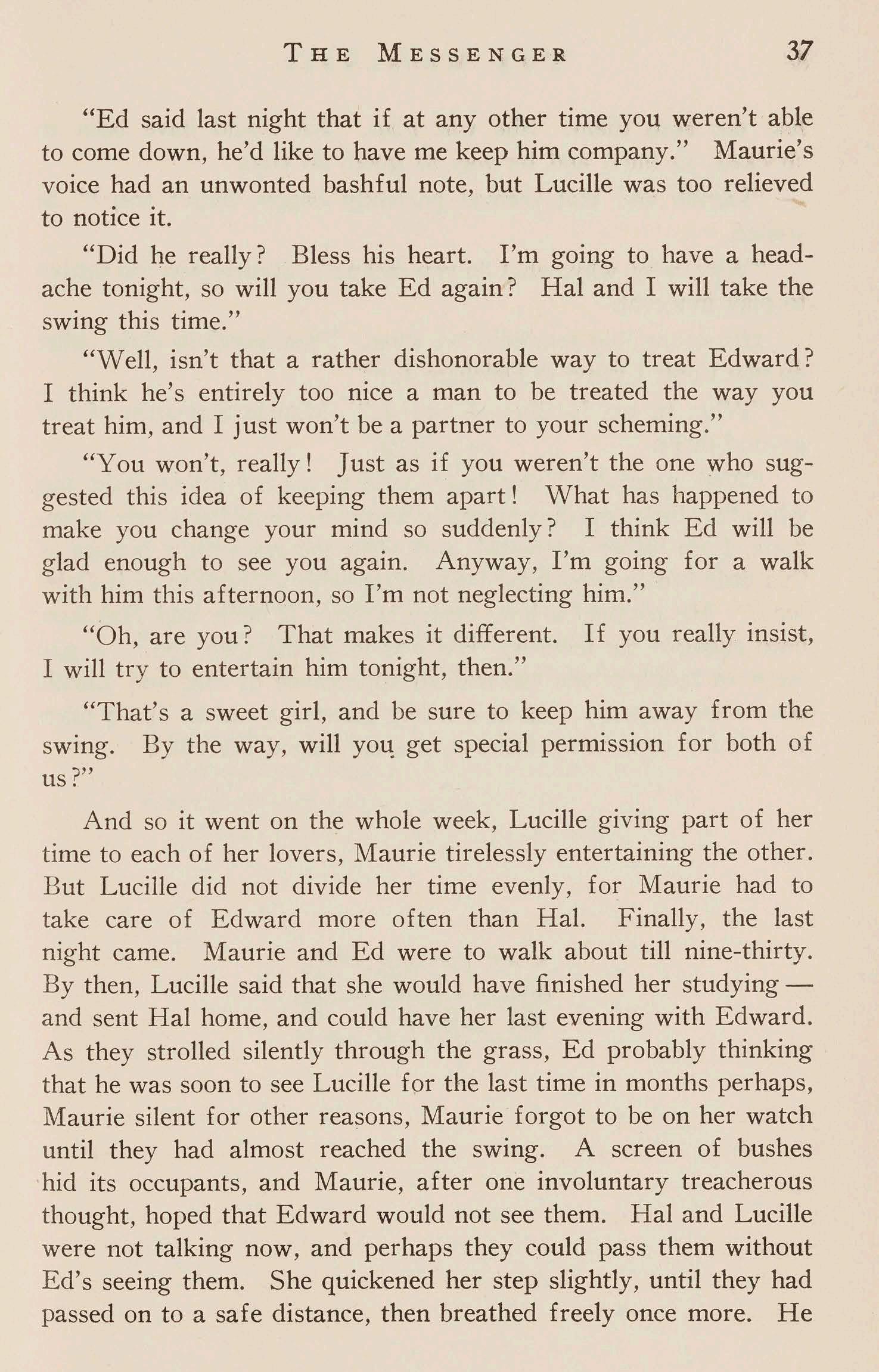
"Ed said last night that if at any other time you weren't able to come down, he'd like to have me keep him company." Maurie's voice had an unwonted bashful note, but Lucille was too relieved to notice it.
"Did he really? Bless his heart. I'm going to have a headache tonight, so will you take Ed again? Hal and I will take the swing this time."
"Well, isn't that a rather dishonorable way to treat Edward? I think he's entirely too nice a man to be treated the way you treat him, and I just won't be a partner to your scheming."
"You won't , really! Just as if you weren't the one who suggested this idea of keeping them apart ! What has happened to make you change your mind so suddenly? I think Ed will be glad enough to see you again. Anyway, I'm going for a walk with him this afternoon, so I'm not neglecting him."
"Oh, are you? That makes it different. If you really insist, I will try to entertain him tonight, then."
"That's a sweet girl, and be sure to keep him away from the swmg. By the way, will yoq get special permission for both of us?"
And so it went on the whole week, Lucille giving part of her time to each of her lovers, Maurie tirelessly entertaining the other. But Lucille did not divide her time evenly, for Maurie had to take care of Edward more often than Hal. Finally, the last night came. Maurie and Ed were to walk about till nine-thirty. By then, Lucille said that she would have finished her studyingand sent Hal home , and could have her last evening with Edward. As they strolled silently through the grass, Ed probably thinking that he was soon to see Lucille for the last time in months perhaps, Maurie silent for other reasons, Maurie forgot to be on her watch until they had almost reached the swing. A screen of bushes hid its occupants, and Maurie, after one involuntary treacherous thought, hoped that Edward would not see them. Hal and Lucille were not talking now, and perhaps they could pass them without Ed's seeing them. She quickened her step slightly, until they had passed on to a safe distance, then breathed freely once more. He
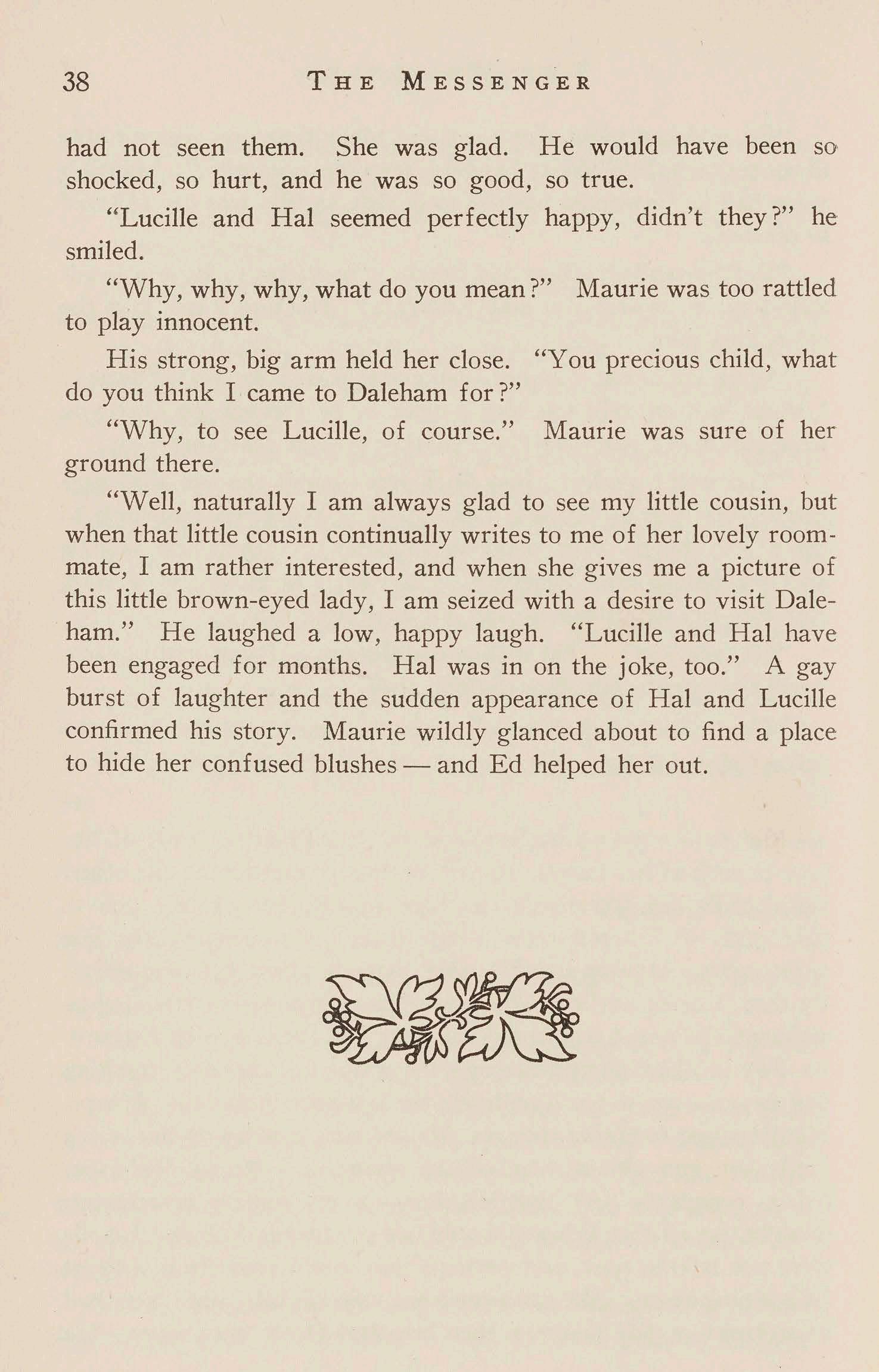
had not seen them. She was glad. He would have been so shocked, so hurt, and he was so good, so true.
"Lucille and Hal seemed perfectly happy, didn't they?" he smiled.
"Why, why, why, what do you mean?" Maurie was too rattled to play innocent.
His strong, big arm held her close. "You precious child, what do you think I came to Daleham for ?"
"Why , to see Lucille, of course." Maurie was sure of he r ground there.
"Well, naturally I am always glad to see my little cousin, but when that little cousin continually writes to me of her lovely roommate , I am rather interested, and when she gives me a picture o f this little brown-eyed lady, I am seized with a desire to visit Daleham ." He laughed a low, happy laugh. "Lucille and Hal hav e been engaged for months. Hal was in on the joke , too ." A ga y burst of laughter and the sudden appearance of Hal and Lucill e confirmed his story . Maurie wildly glanced about to find a plac e to hide her confused blushes -and Ed helped her out.
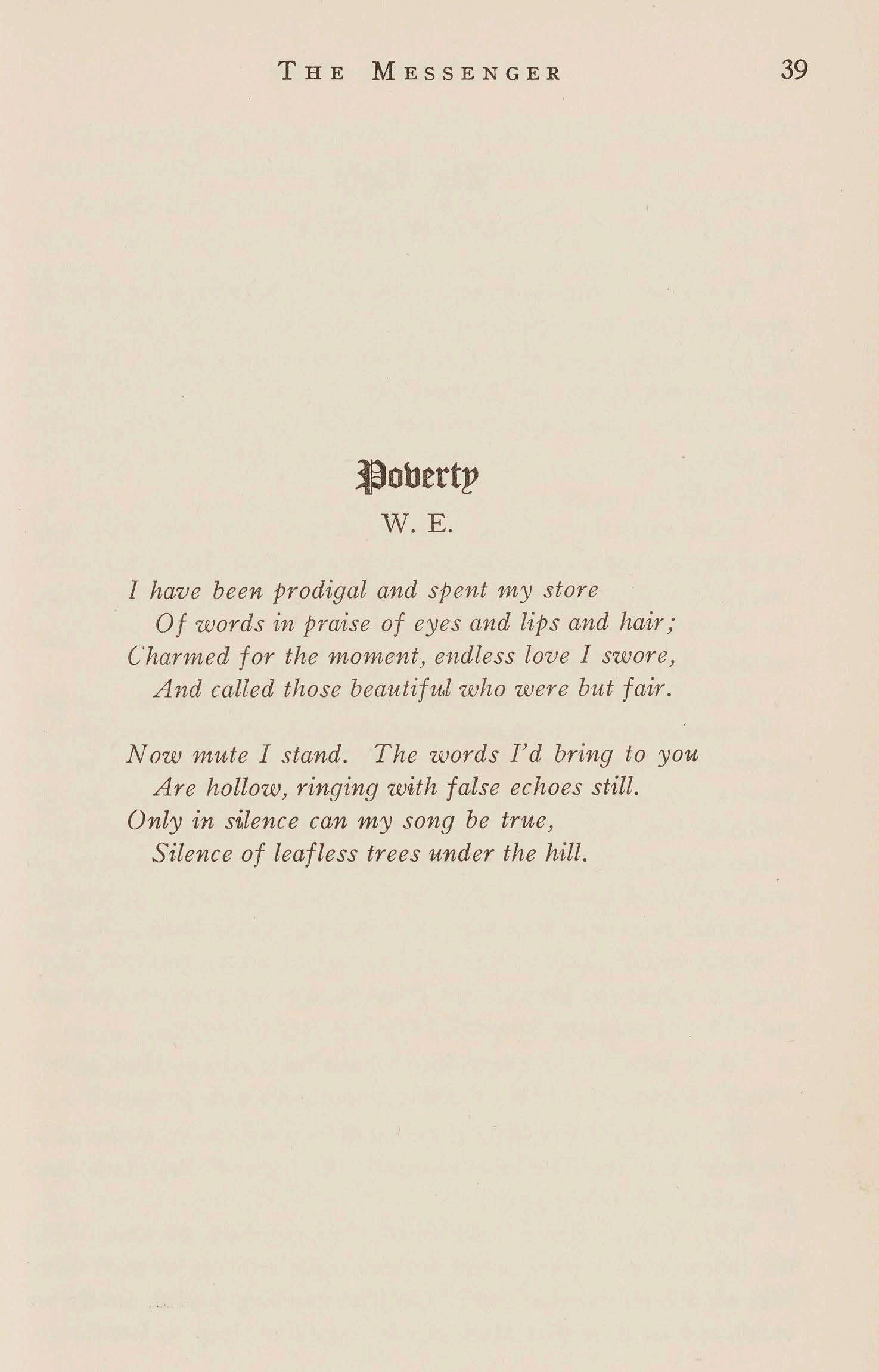
I have been prodigal and spent my store 0 f words in praise of eyes and lips and hair; Charmed for the moment, endless love I swore, And called those beautiful who were but fair.
Now mute I stand. The words I'd bring to you Are hollow, ringing with false echoes still. Only in silence can my song be true, Silence of leafless trees under the hill.
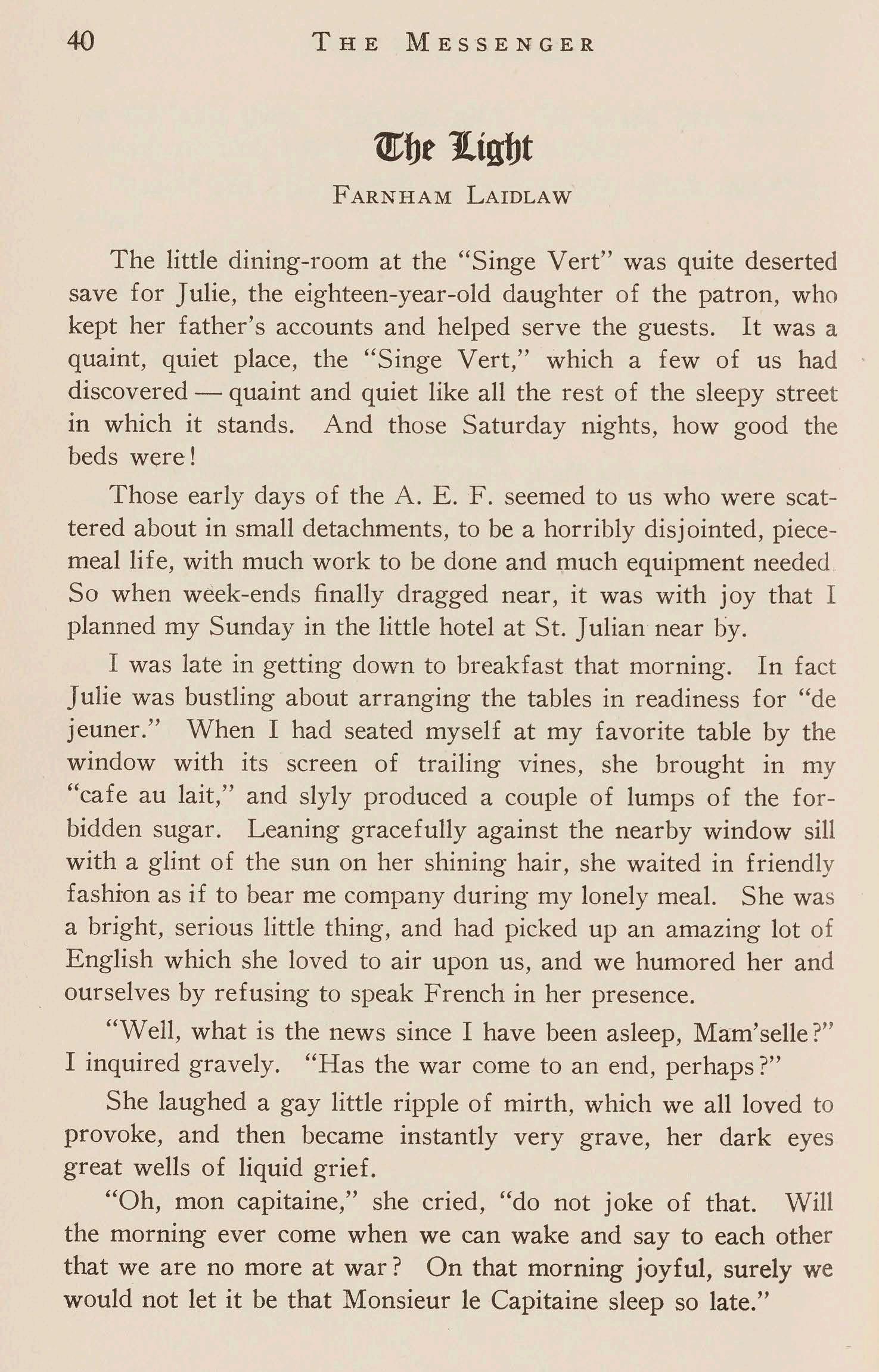
The little dining-room at the "Singe Vert" was quite deserte d save for Julie, the eighteen-year-old daughter of the patron , wh o kept her father's accounts and helped serve the guests. It was a quaint, quiet place, the "Singe Vert," which a few of us ha d discovered - quaint and quiet like all the rest of the sleepy stree t in which it stands. And those Saturday nights, how good th e beds were!
Those early days of the A. E. F. seemed to us who were scattered about in small detachments, to be a horribly disjointed, piecemeal life, with much work to be done and much equipment neede d So when week-ends finally dragged near, it was with joy that I planned my Sunday in the little hotel at St. Julian near by.
I was late in getting down to breakfast that morning. In fa ct Julie was bustling about arranging the tables in readiness for "d e jeuner." When I had seated myself at my favorite table by th e window with its screen of trailing vines, she brought in my "ca£ e au lait," and slyly produced a couple of lumps of the fo rbidden sugar. Leaning gracefully against the nearby window sill with a glint of the sun on her shining hair, she waited in friendl y fashion as if to bear me company during my lonely meal. She wa s a bright, serious little thing, and had picked up an amazing lot of English which she loved to air upon us, and we humored her an d ourselves by refusing to speak French in her presence.
"Well, what is the news since I have been asleep, Mam'selle ?" I inquired gravely. "Has the war come to an end, perhaps?"
She laughed a gay little ripple of mirth, which we all loved t o provoke, and then became instantly very grave, her dark eyes great wells of liquid grief.
"Oh, mon capitaine," she cried, "do not joke of that. Will the morning ever come when we can wake and say to each othe r that we are no more at war? On that morning joyful, surely we would not let it be that Monsieur le Capitaine sleep so late."
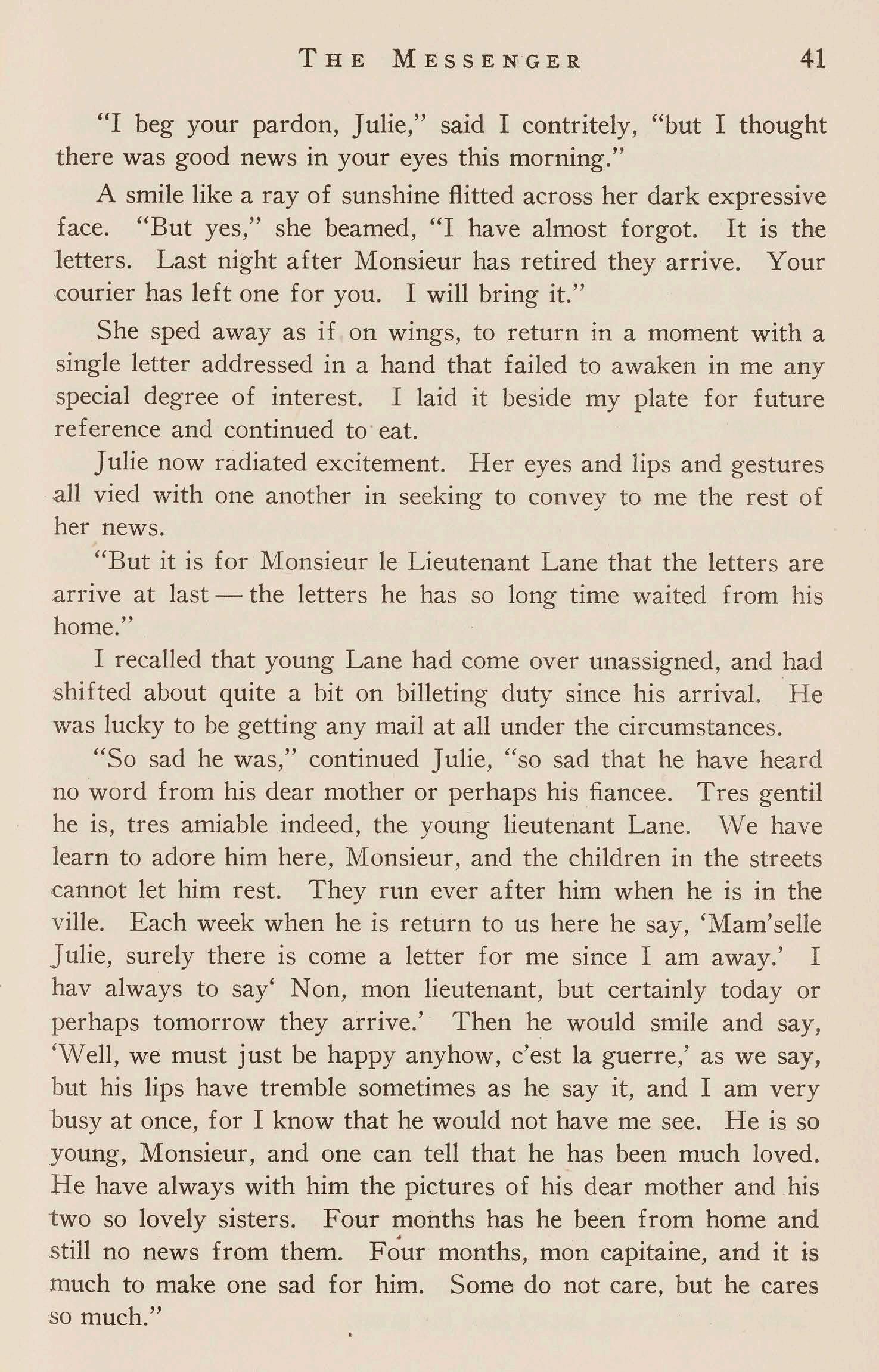
"I beg your pardon, Julie," said I contritely, "but I thought t here was good news in your eyes this morning."
A smile like a ray of sunshine flitted across her dark expressive face. "But yes," she beamed, "I have almost forgot. It is the letters. Last night after Monsieur has retired they arrive. Your c ourier has left one for you. I will bring it."
She sped away as if on wings , to return in a moment with a single letter addressed in a hand that failed to awaken in me any special degree of interest. I laid it beside my plate for future reference and continued to eat.
Julie now radiated excitement. Her eyes and lip s and gestures a ll vied with one another in seeking to convey to me the rest o f her news.
"But it is for Monsieur le Lieutenant Lane that the letter s are a rrive at last - the letters he ha s so long time waited from hi s home."
I recalled that young Lane had come over unassigned, and ha d shifted about quite a bit on billeting duty since his arrival. He was lucky to be getting any mail at all under the circumstance s .
"So sad he was ," continued Julie , "so sad that he have hear d no word from his dear mother or perhaps his fiancee. Tres gentil he is , tres amiable indeed, the young lieutenant Lane. We ha v e learn to adore him here, Monsieur, and the children in the street s c annot let him rest. They run ever after him when he is in the ville. Each week when he is return to us here he say, 'Mam'selle J ulie, surely there is come a letter for me since I am away.' I hav always to say' Non, mon lieutenant, but certainly today or p erhaps tomorrow they arrive.' Then he would smile and say , ' Well, we must just be happy anyhow, c'est la guerre,' as we say, but his lips have tremble sometimes as he say it, and I am very busy at once, for I know that he would not have me see. He is so y oung, Monsieur, and one can tell that he has been much loved. He have always with him the pictures of his dear mother and his two so lovely sisters. Four months has he been from home and s till no news from them. Four months, mon capitaine, and it is much to make one sad for him. Some do not care, but he cares .so much."
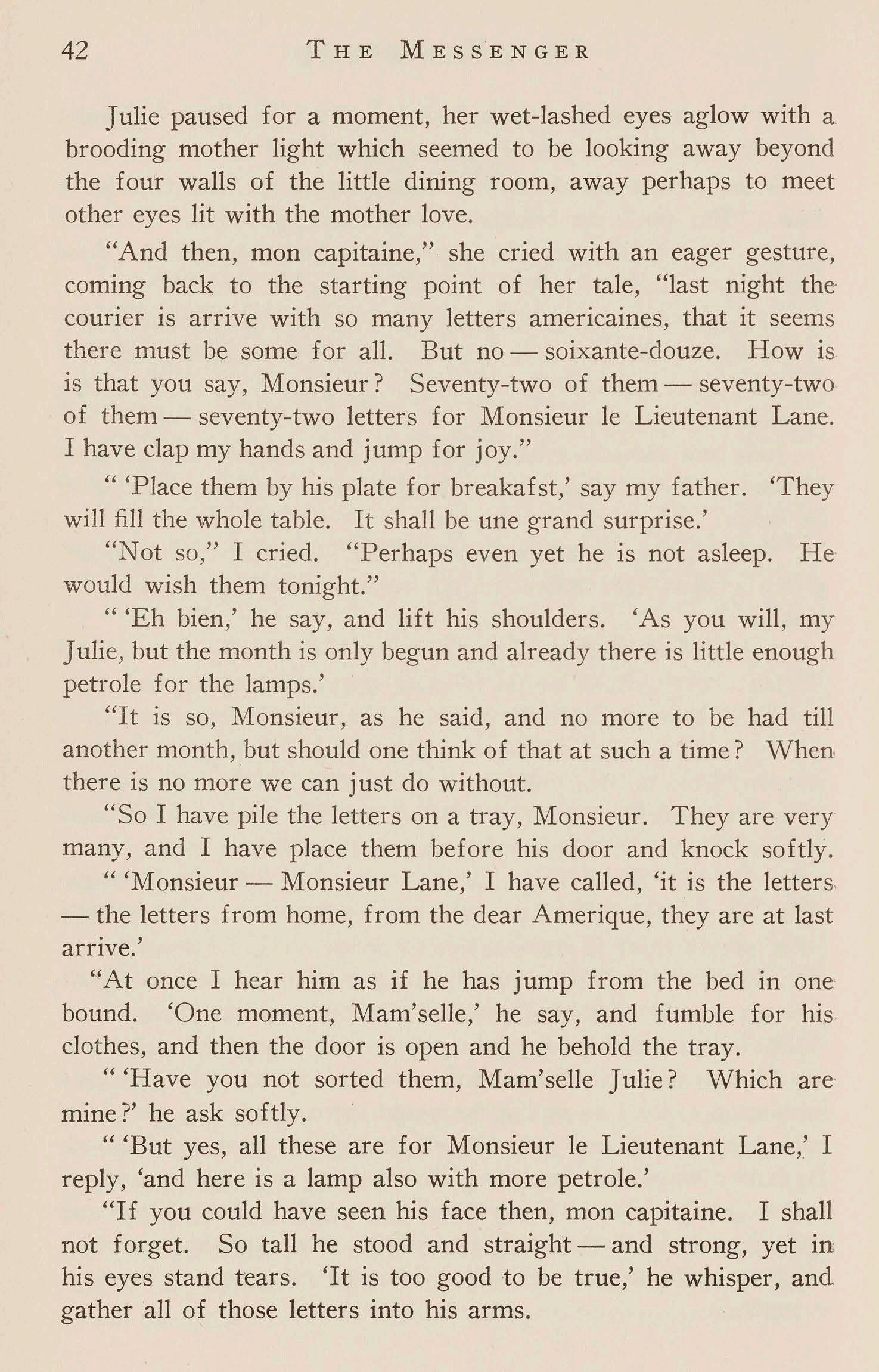
Julie paused for a moment, her wet-lashed eyes aglow with a brooding mother light which seemed to be looking away beyond the four walls of the little dining room, away perhaps to meet other eyes lit with the mother love.
"And then, mon capitaine," she cried with an eager gesture , coming back to the starting point of her tale, "last night th e courier is arrive with so many letters americaines, that it seem s there must be some for all. But no -soixante-douze. How is is that you say, Monsieur? Seventy-two of them -seventy-tw o of them -seventy-two letters for Monsieur le Lieutenant Lane. I have clap my hands and jump for joy."
" ' Place them by his plate for breakaf st,' say my father. 'The y will fill the whole table . It shall be une grand surprise .'
"Not so ," I cried. "Perhaps even yet he is not asleep. H e· would wish them tonight."
"'Eh bien ,' he say, and lift his shoulders. 'As you will, m y Julie , but the month is only begun and already there is little enough petrole for the lamps.'
"It is so, Monsieur, as he said, and no more to be had till another month, but should one think of that at such a time? When there is no more we can just do without.
"So I have pile the letters on a tray, Monsieur. They are very many, and I have place them before his door and knock softly.
" 'Monsieur -Monsieur Lane,' I have called, 'it is the letter s -the letters from home, from the dear Amerique, they are at last arrive.'
'"At once I hear him as if he has jump from the bed in one bound. 'One moment, Mam'selle,' he say, and fumble for his clothes, and then the door is open and he behold the tray.
"'Have you not sorted them, Mam'selle Julie? Which are mine?' he ask softly.
" 'But yes, all these are for Monsieur le Lieutenant Lane,' I reply, 'and here is a lamp also with more petrole.'
"If you could have seen his face then, mon capitaine. I shall not forget. So tall he stood and straight-and strong, yet in his eyes stand tears. 'It is too good to be true,' he whisper, and gather all of those letters into his arms.
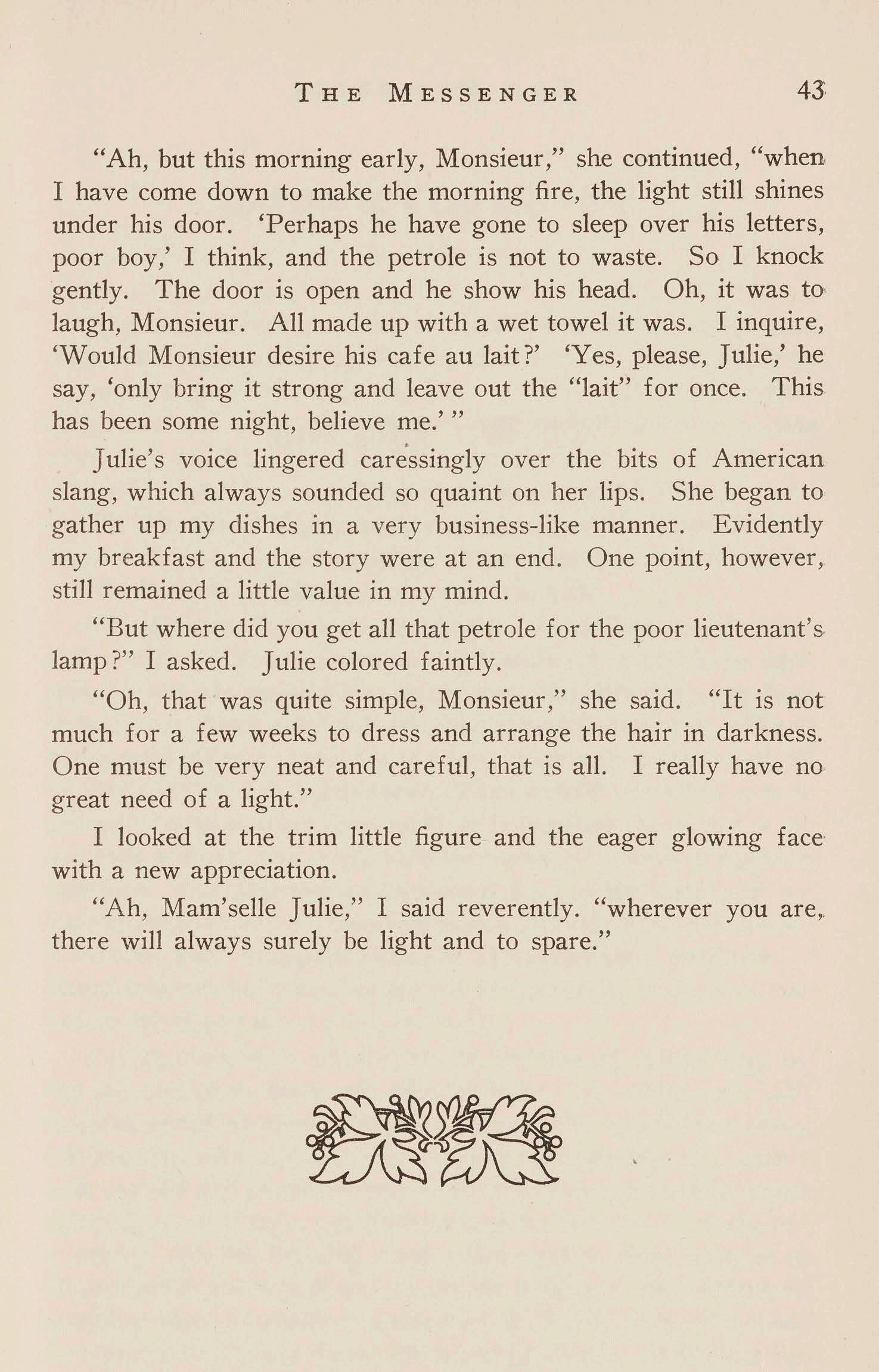
"Ah, but this morning early, Monsieur," she continued, "when I have come down to make the morning fire, the light still shines under his door. 'Perhaps he have gone to sleep over his letters, poor boy,' I think, and the petrole is not to waste. So I knock gently. The door is open and he show his head. Oh, it was to laugh, Monsieur. All made up with a wet towel it was. I inquire, 'Would Monsieur desire his cafe au lait ?' 'Yes, please, Julie,' he say, 'only bring it strong and leave out the "lait" for once. This has been some night, believe me.' "
Julie's voice lingered caressingly over the bits of American slang, which always sounded so quaint on her lips. She began to gather up my dishes in a very business-like manner. Evidently my breakfast and the story were at an end . One point, however, still remained a little value in my mind.
"But where did you get all that petrole for the poor lieutenant's lamp?" I asked. Julie colored faintly.
"Oh, that was quite simple, Monsieur,'' she said. "It is not much for a few weeks to dress and arrange the hair in darkness. One must be very neat and careful, that is all. I really have no great need of a light.''
I looked at the trim little figure and the eager glowing face with a new appreciation.
"Ah, Mam'selle Julie,'' I said reverently. "wherever you are, . there will always surely be light and to spare.''
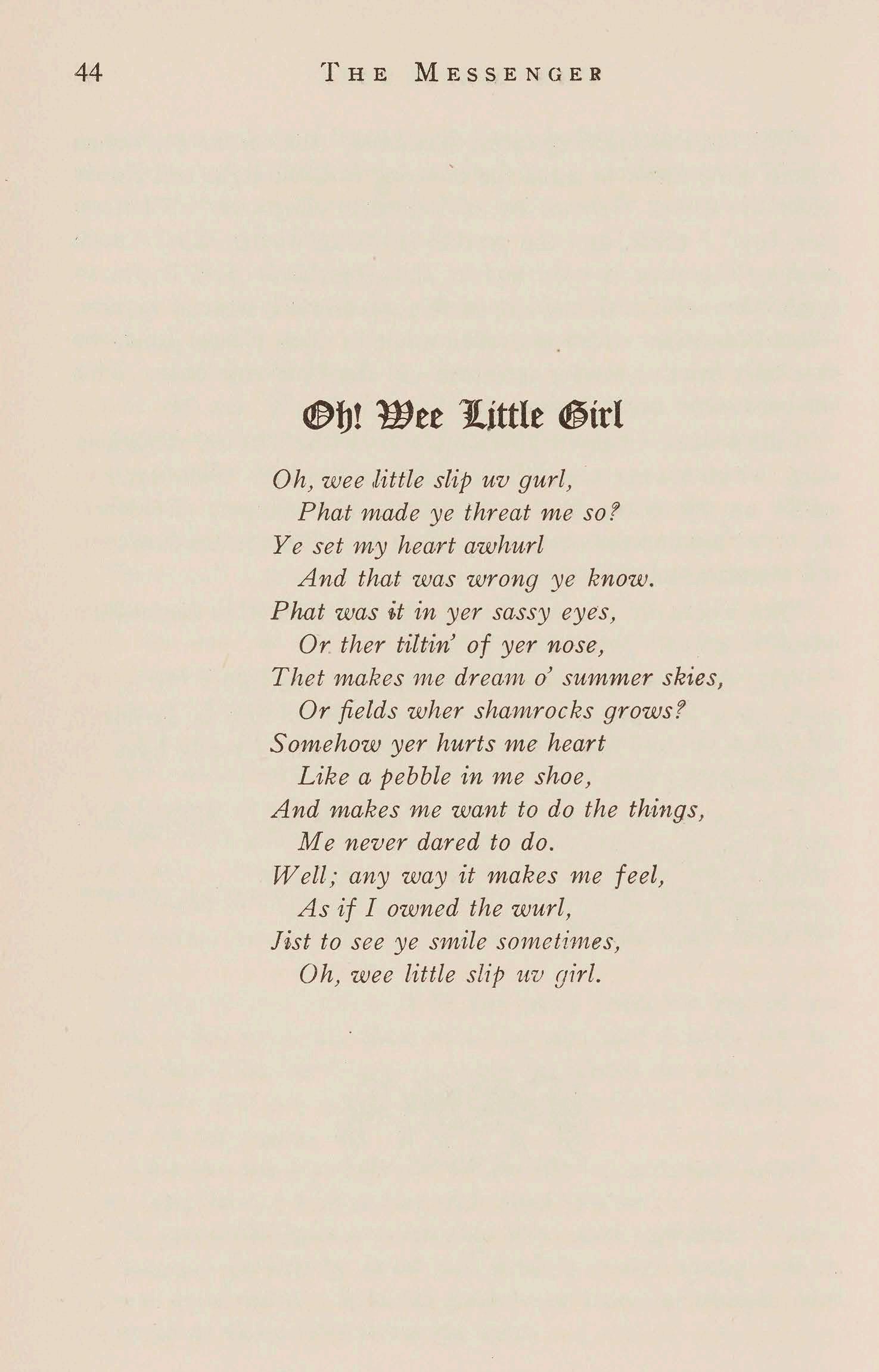
Oh , wee little slip uv gurl , Phat made ye threat me so?
Ye set my heart awhurl
And that was wrong ye know. Phat was it in yer sassy eyes, Or. ther tiltin' of yer nose, Thet makes me dream o' summer skies, Or fields wher shamrocks grows ?
Somehow yer hurts me heart Like a pebble in me shoe, And makes me want to do the things , Me never dared to do.
Well; any way it makes me feel, As if I owned the wurl, list to see ye smile sometimes, Oh , wee little slip uv girl.
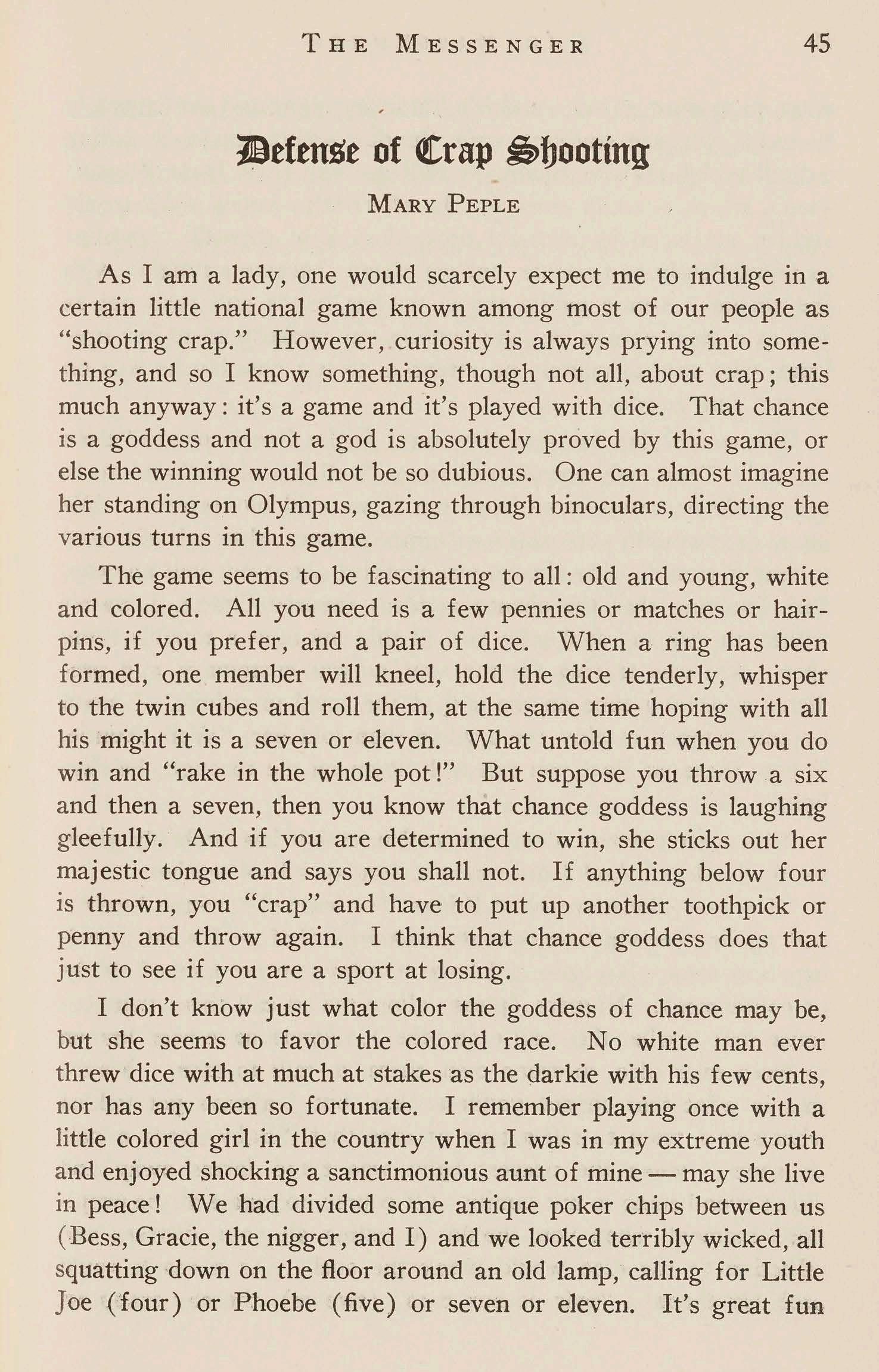
MARY PEPLE
As I am a lady, one would scarcely expect me to indulge in a certain little national game known among most of our people as " shooting crap ." However , curiosity is always prying into somet hing, and so I know something, though not all, about crap; this much anyway: it's a game and it's played with dice . That chance is a goddess and not a god is absolutely proved by thi s game, or else the winning would not be so dubious. One can almost imagine her standing on Olympus, gazing through binoculars, directing the various turns in this game.
The game seems to be fascinating to all: old and young, white a nd colored. All you need is a few pennies or matches or hairpi ns , if you prefer, and a pair of dice. When a ring has been fo rmed , one member will kneel, hold the dice tenderly, whisper t o the twin cubes and roll them, at the same time hoping with all his might it is a seven or eleven. What untold fun when you do win and "rake in the whole pot!" But suppose you throw a six a nd then a seven, then you know that chance goddess is laughing gleefully. And if you are determined to win, she sticks out her majestic tongue and says you shall not. If anything below four is thrown, you "crap" and have to put up another toothpick or penny and throw again. I think that chance goddess does that j ust to see if you are a sport at losing.
I don't know just what color the goddess of chance may be, but she seems to favor the colored race. No white man ever t hrew dice with at much at stakes as the darkie with his few cents, n or has any been so fortunate. I remember playing once with a little colored girl in the country when I was in my extreme youth and enjoyed shocking a sanctimonious aunt of mine-may she live in peace ! We had divided some antique poker chips between us ( Bess, Gracie, the nigger, and I) and we looked terribly wicked, all squatting down on the floor around an old lamp, calling for Little J oe (four) or Phoebe (five) or seven or eleven. It's great fun
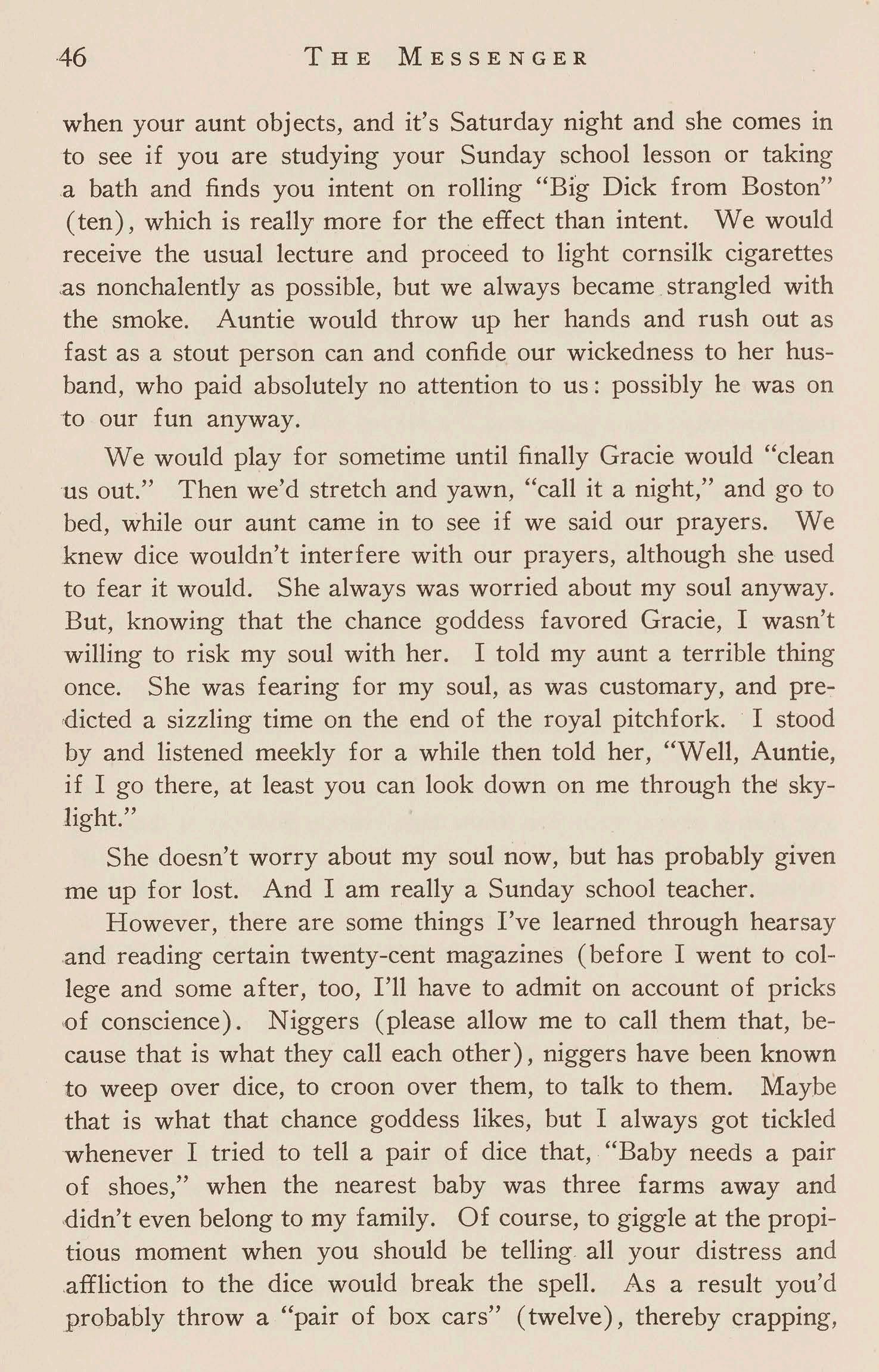
when your aunt objects, and it's Saturday night and she comes in to see if you are studying your Sunday school lesson or taking a bath and finds you intent on rolling "Big Dick from Boston" (ten), which is really more for the effect than intent. We would receive the usual lecture and proceed to light cornsilk cigarettes as nonchalently as possible, but we always became strangled with the smoke. Auntie would throw up her hands and rush out as fast as a stout person can and confide our wickedness to her husband, who paid absolutely no attention to us: possibly he was on to our fun anyway.
We would play for sometime until finally Gracie would "clean us out." Then we'd stretch and yawn, "call it a night," and go to bed, while our aunt came in to see if we said our prayers. We knew dice wouldn't interfere with our prayers, although she used to fear it would. She always was worried about my soul anyway. But, knowing that the chance goddess favored Gracie, I wasn't willing to risk my soul with her. I told my aunt a terrible thing once. She was fearing for my soul, as was customary, and pre•dicted a sizzling time on the end of the royal pitchfork. I stood by and listened meekly for a while then told her, "Well, Auntie, if I go there, at least you can look down on me through the skylight."
She doesn't worry about my soul now, but has probably given me up for lost. And I am really a Sunday school teacher. However, there are some things I've learned through hearsay and reading certain twenty-cent magazines (before I went to college and some after, too, I'll have to admit on account of pricks ,of conscience). Niggers (please allow me to call them that, because that is what they call each other), niggers have been known to weep over dice, to croon over them, to talk to them. Maybe that is what that chance goddess likes, but I always got tickled whenever I tried to tell a pair of dice that, "Baby needs a pair of shoes," when the nearest baby was three farms away and -didn't even belong to my family. Of course, to giggle at the propitious moment when you should be telling all your distress and .affliction to the dice would break the spell. As a result you'd probably throw a "pair of box cars" (twelve), thereby crapping,
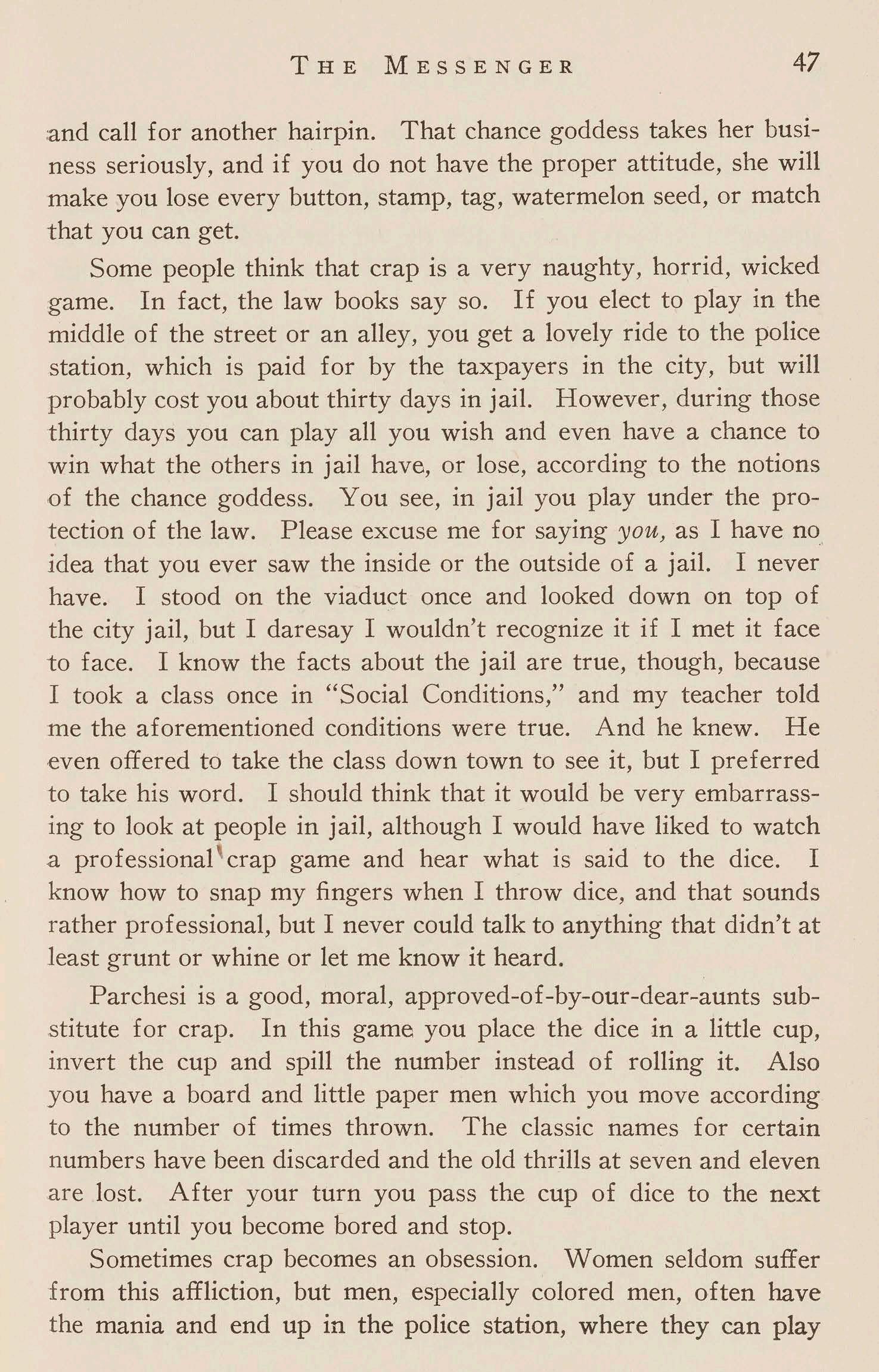
and call for another hairpin. That chance goddess takes her business seriously, and if you do not have the proper attitude, she will make you lose every button, stamp, tag, watermelon seed, or match that you can get.
Some people think that crap is a very naughty, horrid, wicked game. In fact, the law books say so. If you elect to play in the middle of the street or an alley, you get a lovely ride to the police station, which is paid for by the taxpayers in the city, but will probably cost you about thirty days in jail. However, during those thirty days you can play all you wish and even have a chance to win what the others in jail have, or lose, according to the notions of the chance goddess. You see, in jail you play under the protection of the law. Please excuse me for saying you, as I have no idea that you ever saw the inside or the outside of a jail. I never have. I stood on the viaduct once and looked down on top of the city jail, but I daresay I wouldn't recognize it if I met it face to face. I know the facts about the jail are true, though, because I took a class once in "Social Conditions," and my teacher told me the aforementioned conditions were true. And he knew. He even offered to take the class down town to see it, but I preferred to take his word. I should think that it would be very embarrassing to look at people in jail, although I would have liked to watch a professional ' crap game and hear what is said to the dice. I know how to snap my fingers when I throw dice, and that sounds rather professional, but I never could talk to anything that didn't at least grunt or whine or let me know it heard.
Parchesi is a good, moral, approved-of-by-our-dear-aunts substitute for crap. In this game you place the dice in a little cup, invert the cup and spill the number instead of rolling it. Also you have a board and little paper men which you move according to the number of times thrown. The classic names for certain numbers have been discarded and the old thrills at seven and eleven are lost. After your turn you pass the cup of dice to the next player until you become bored and stop. Sometimes crap becomes an obsession. Women seldom suffer from this affliction, but men, especially colored men, often have the mania and end up in the police station, where they can play

without leading the public astray or inflicting the citizens with . this peculiar form of insanity.
I have long since outgrown the days when I enjoyed crap, although I do keep a pair of dice for old time's sake. They would be of little use to me now, except perhaps as a means of getting hairpins.
I like to throw them and muse over them. I always think of an impromptu engagement Bess and I had one night with a redhaired boy. As was the custom in the country he just came one Sunday night. He had a pair of dice with him, and probably thought that he should have them to show his then dawning manhood. I borrowed them and my education began. Nor it is completed as yet. One of these days I am going to venture inside a jail, and listen and watch, then maybe I can flatter that chance goddess into letting me win at least a hairpin.
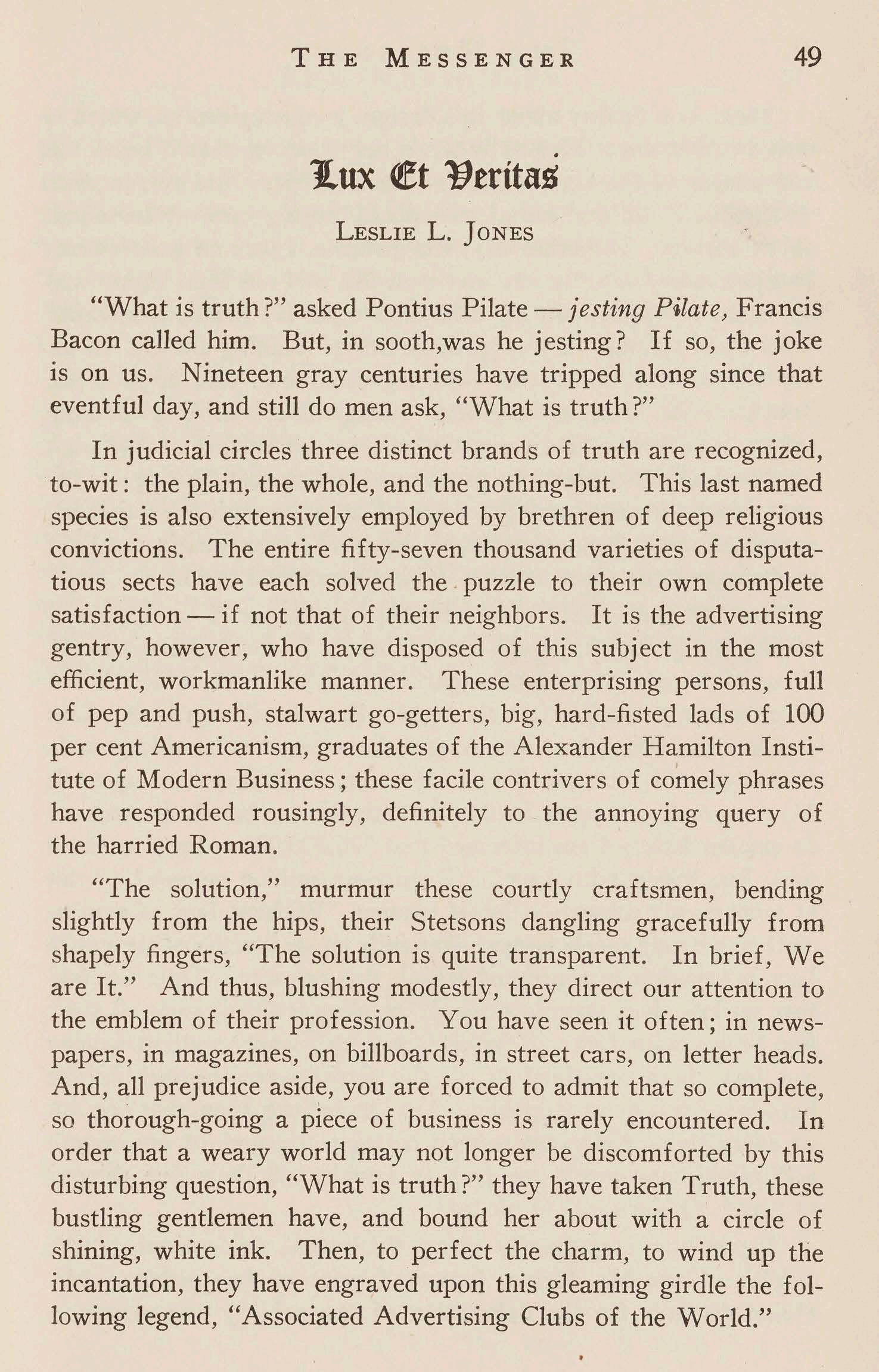
LESLIE L. JONES
"What is truth?" asked Pontius Pilate - jesting Pilate, Francis Bacon called him. But, in sooth,was he jesting? If so, the joke is on us. Nineteen gray centuries have tripped along since that eventful day, and still do men ask, "What is truth?"
In judicial circles three distinct brands of truth are recognized, to-wit: the plain, the whole, and the nothing-but. This last named species is also extensively employed by brethren of deep religious convictions. The entire fifty-seven thousand varieties of disputatious sects have each solved the puzzle to their own complete satisfaction - if not that of their neighbors. It is the advertising gentry, however, who have disposed of this subject in the most efficient, workmanlike manner. These enterprising persons, full of pep and push, stalwart go-getters, big, hard-fisted lads of 100 per cent Americanism, graduates of the Alexander Hamilton Institute of Modern Business ; these facile contrivers of comely phrases have responded musingly, definitely to the annoying query of the harried Roman.
"The solution," murmur these courtly era£ tsmen, bending slightly from the hips, their Stetsons dangling gracefully from shapely fingers, "The solution is quite transparent. In brief, We are It." And thus, blushing modestly, they direct our attention to the emblem of their profession. You have seen it often; in newspapers, in magazines, on billboards, in street cars, on letter heads. And, all prejudice aside, you are forced to admit that so complete, so thorough-going a piece of business is rarely encountered. In order that a weary world may not longer be discomforted by this disturbing question, "What is truth?" they have taken Truth, these bustling gentlemen have, and bound her about with a circle of shining, white ink. Then, to perfect the charm, to wind up the incantation, they have engraved upon this gleaming girdle the following legend, "Associated Advertising Clubs of the World."
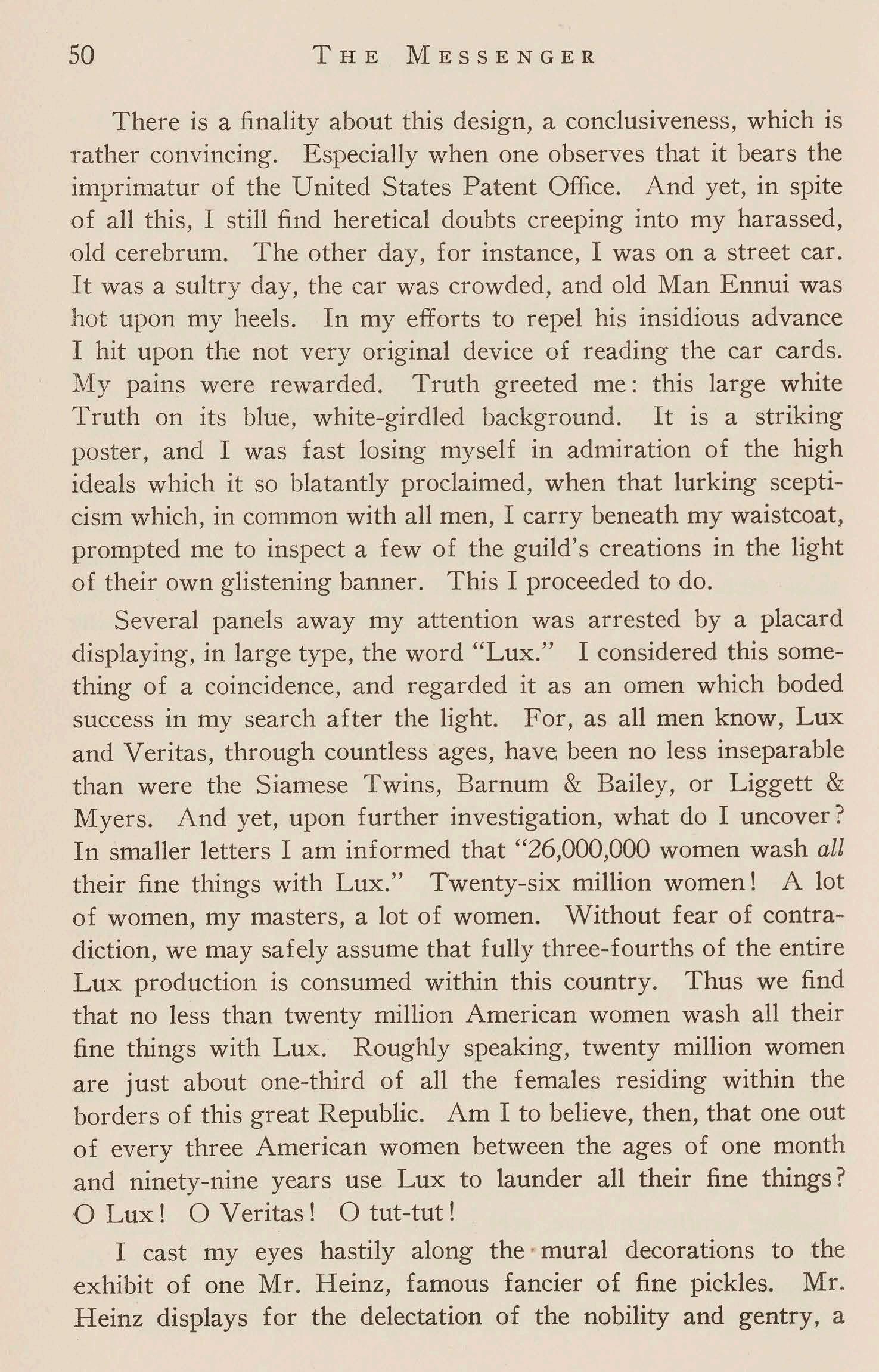
There is a finality about this design, a conclusiveness, which is rather convincing. Especially when one observes that it bears the imprimatur of the United States Patent Office. And yet, in spite of all this, I still find heretical doubts creeping into my harassed, old cerebrum. The other day, for instance, I was on a street car. It was a sultry day, the car was crowded, and old Man Ennui was hot upon my heels. In my efforts to repel his insidious advance I hit upon the not very original device of reading the car cards. My pains were rewarded. Truth greeted me: this large white Truth on its blue, white-girdled background. It is a striking poster, and I was fast losing myself in admiration of the high ideals which it so blatantly proclaimed, when that lurking scepticism which, in common with all men, I carry beneath my waistcoat, prompted me to inspect a few of the guild's creations in the light of their own glistening banner. This I proceeded to do.
Several panels away my attention was arrested by a placard displaying, in large type, the word "Lux." I considered this something of a coincidence, and regarded it as an omen which boded success in my search after the light. For, as all men know, Lux and Veritas, through countless ages, have been no less inseparable than were the Siamese Twins, Barnum & Bailey, or Liggett & Myers. And yet, upon further investigation, what do I uncover? In smaller letters I am informed that "26,000,000 women wash all their fine things with Lux." Twenty-six million women! A lot of women, my masters, a lot of women. Without fear of contradiction, we may safely assume that fully three-fourths of the entire Lux production is consumed within this country. Thus we find that no less than twenty million American women wash all their fine things with Lux. Roughly speaking, twenty million women are just about one-third of all the females residing within the borders of this great Republic. Am I to believe, then, that one out of every three American women between the ages of one month and ninety-nine years use Lux to launder all their fine things? 0 Lux! 0 Veritas ! 0 tut-tut!
I cast my eyes hastily along the mural decorations to the exhibit of one Mr. Heinz, famous fancier of fine pickles. Mr . Heinz displays for the delectation of the nobility and gentry, a
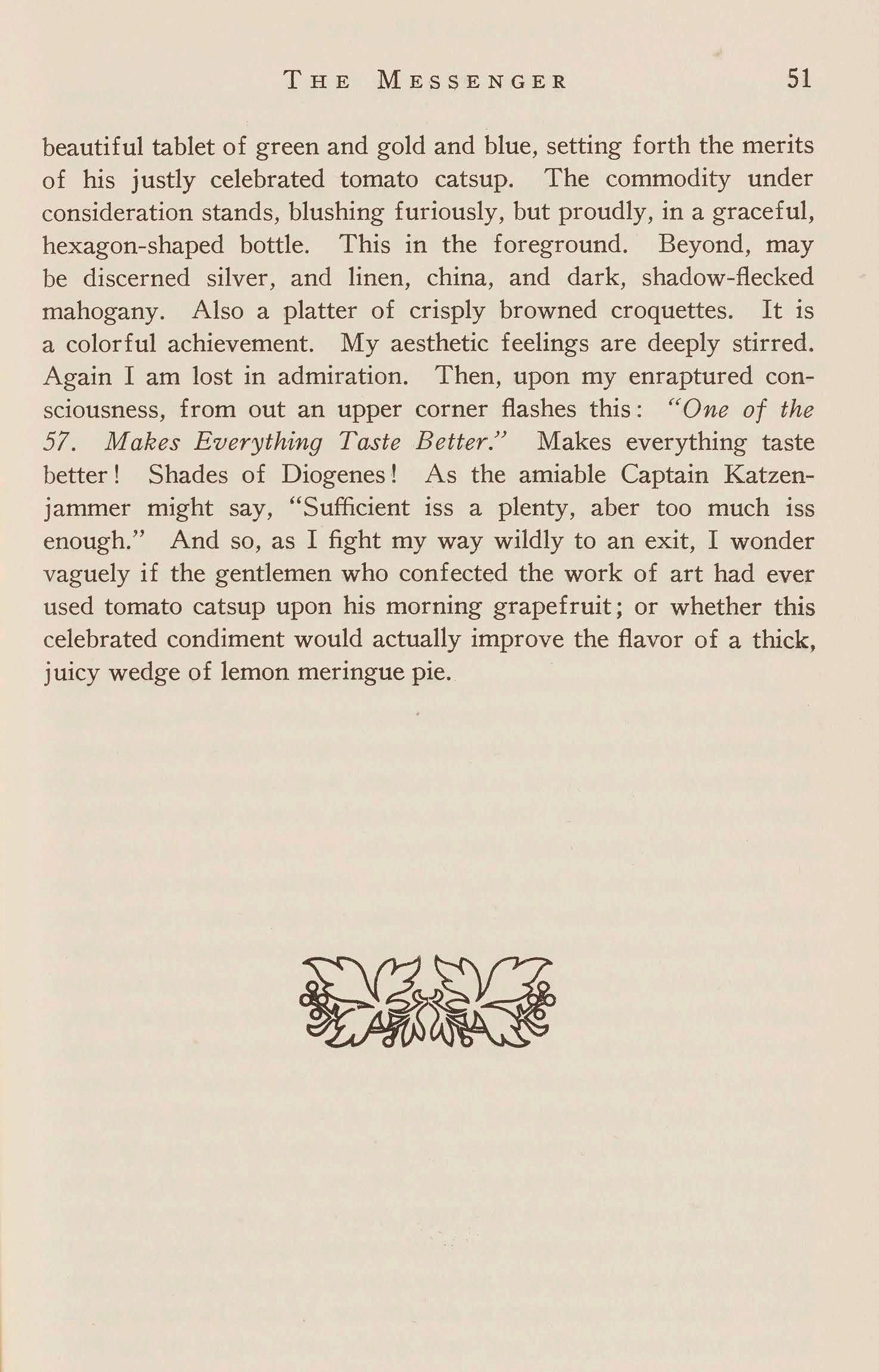
beautiful tablet of green and gold and blue, setting forth the merits of his justly celebrated tomato catsup. The commodity under consideration stands, blushing furiously, but proudly, in a graceful, hexagon-shaped bottle. This in the foreground . Beyond, may be discerned silver, and linen, china, and dark, shadow-flecked mahogany. Also a platter of crisply browned croquettes. It is a colorful achievement. My aesthetic feelings are deeply stirred. Again I am lost in admiration. Then, upon my enraptured consciousness, from out an upper corner flashes this : "One of the 57. Makes Everything Taste Better." Makes everything taste better! Shades of Diogenes! As the amiable Captain Katzenjammer might say, "Sufficient iss a plenty, aber too much iss enough." And so, as I fight my way wildly to an exit, I wonder vaguely if the gentlemen who confected the work of art had ever used tomato catsup upon his morning grapefruit; or whether this celebrated condiment would actually improve the flavor of a thick, juicy wedge of lemon meringue pie.
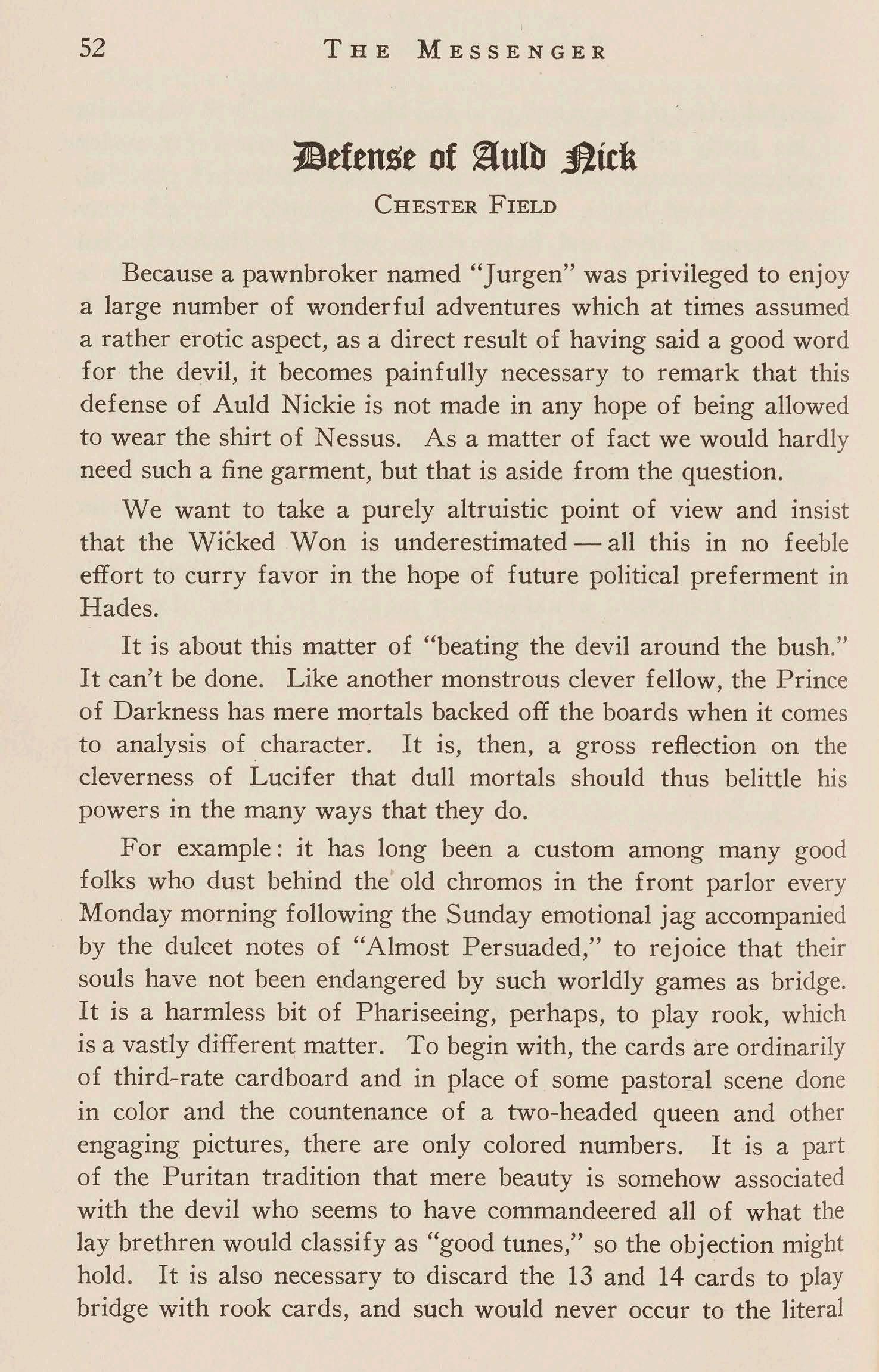
CHESTER FIELD
Because a pawnbroker named "Jurgen " was privileged to enj oy a large number of wonderful adventures which at times assum ed a rather erotic aspect, as a direct result of having said a good w ord for the devil, it becomes painfully necessary to remark that t his defense of Auld Nickie is not made in any hope of being all ow ed to wear the shirt of N essus. A s a matter of fact we would har dly need such a fine garment , but that is aside from the question.
We want to take a purely altruistic point of view and in sist that the Wicked Won is underestimated-all this in no f eeble effort to curry favor in the hope of future political preferment in Hades.
It is about this matter of "beating the devil around the bu sh ." It can ' t be done . Like another mon strous clever fellow , the Pri nce of Darkness has mere mortals backed off the boards when it comes to analy si s of character. It is, then, a gross reflection on t he cleverness of Lucifer that dull mortals should thus belittle his powers in the many ways that they do.
For example : it has long been a custom among many good folk s who dust behind the old chromos in the front parlor every Monday morning following the Sunday emotional jag accompan ied by the dulcet notes of "Almost Persuaded," to rejoice that th eir souls have not been endangered by such worldly games as bri dge. It is a harmless bit of Phariseeing, perhaps, to play rook, wh ich i s a vastly different matter. To begin with , the cards are ordin arily of third-rate cardboard and in place of some pastoral scene done in color and the countenance of a two-headed queen and ot her engaging pictures, there are only colored numbers. It is a part of the Puritan tradition that mere beauty is somehow associ ated with the devil who seems to have commandeered all of what the lay brethren would classify as "good tunes," so the objection might hold. It is also necessary to discard the 13 and 14 cards to p lay bridge with rook cards, and such would never occur to the lit eral
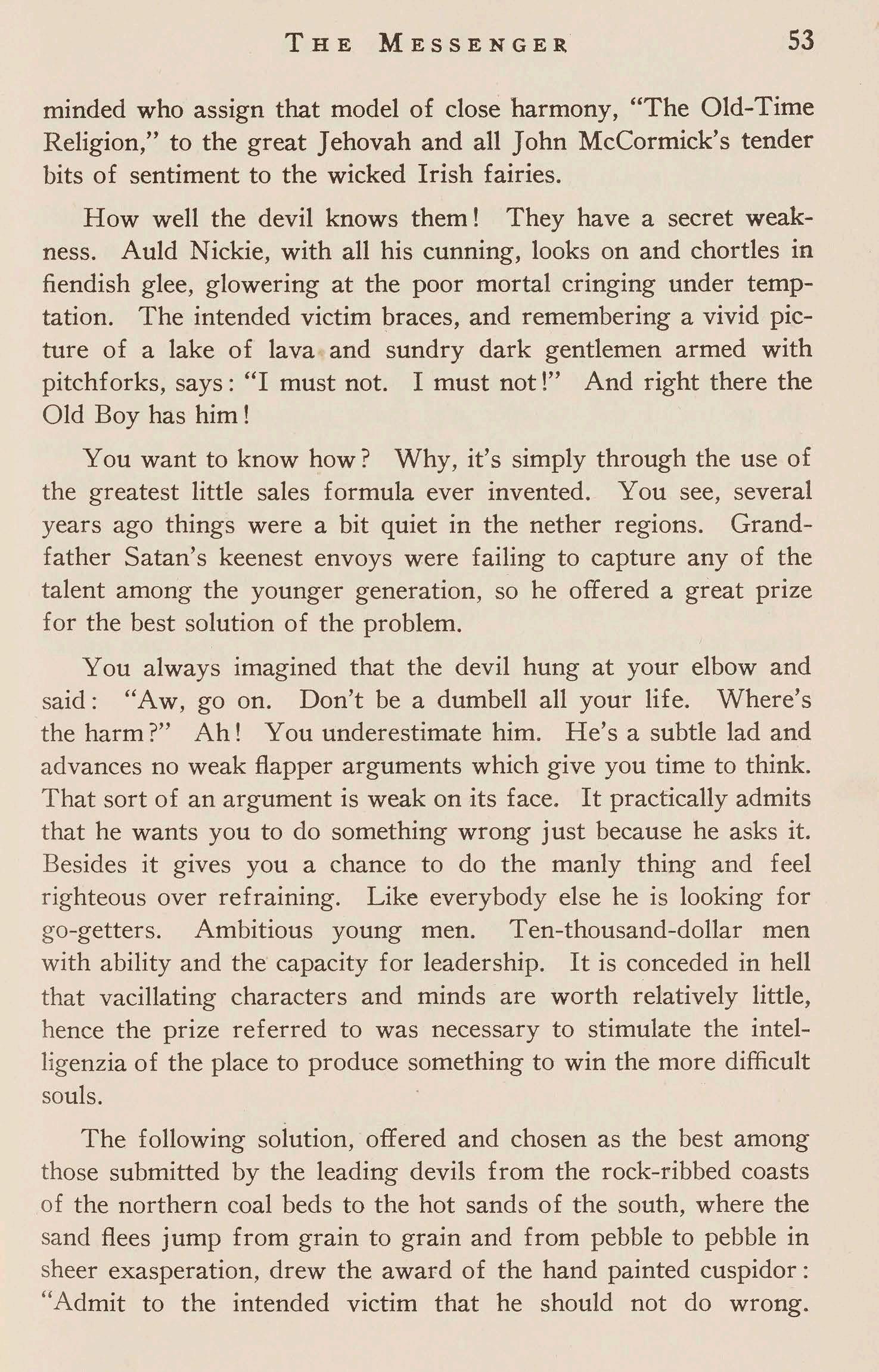
minded who assign that model of close harmony, "The Old-Time Religion," to the great Jehovah and all John McCormick's tender bits of sentiment to the wicked Irish fairies.
How well the devil knows them! They have a secret weakness. Auld Nickie, with all his cunning, looks on and chortles in fiendish glee, glowering at the poor mortal cringing under temptation. The intended victim braces, and remembering a vivid picture of a lake of lava and sundry dark gentlemen armed with pitchforks, says: "I must not. I must not!" And right there the Old Boy has him!
You want to know how? Why, it's simply through the use of the greatest little sales formula ever invented. You see, several years ago things were a bit quiet in the nether regions. Grandfather Satan's keenest envoys were failing to capture any of the talent among the younger generation, so he offered a great prize for the best solution of the problem.
You always imagined that the devil hung at your elbow and said: "Aw, go on. Don't be a dumbell all your life. Where's the harm?" Ah! You underestimate him. He's a subtle lad and advances no weak flapper arguments which give you time to think. That sort of an argument is weak on its face. It practically admits that he wants you to do something wrong just because he asks it. Besides it gives you a chance to do the manly thing and feel righteous over refraining. Like everybody else he is looking for go-getters . Ambitious young men. Ten-thousand-dollar men with ability and the capacity for leadership. It is conceded in hell that vacillating characters and minds are worth relatively little, hence the prize referred to was necessary to stimulate the intelligenzia of the place to produce something to win the more difficult souls.
The following solution, offered and chosen as the best among tho se submitted by the leading devils from the rock-ribbed coasts of the northern coal beds to the hot sands of the south, where the sand flees jump from grain to grain and from pebble to pebble in sheer exasperation, drew the award of the hand painted cuspidor : "A dmit to the intended victim that he should not do wrong.
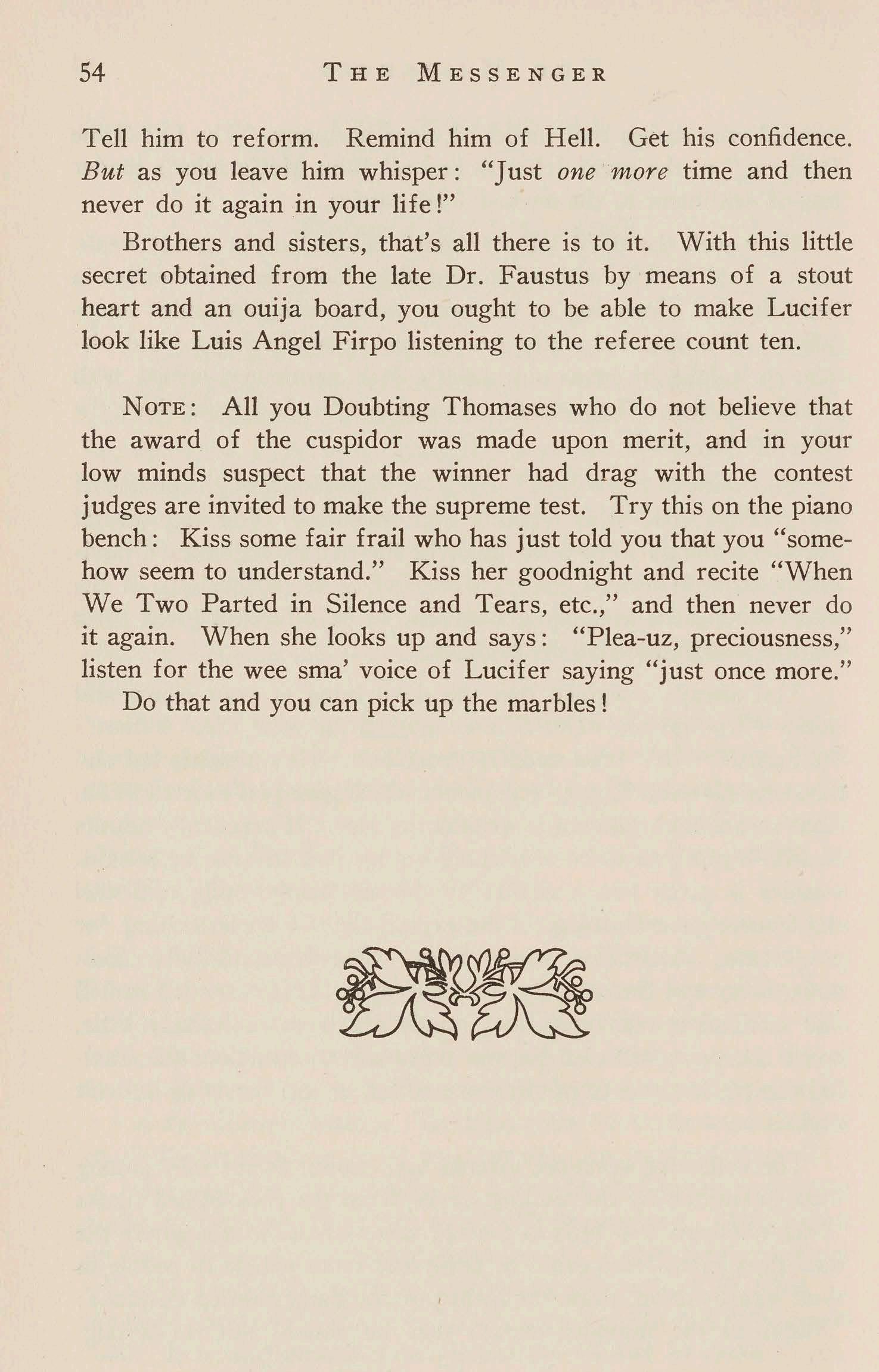
Tell him to reform. Remind him of Hell. Get his confidence. But as you leave him whisper: "Just one more time and then never do it again in your Ii£e !"
Brothers and sisters, that's all there is to it. With this little secret obtained from the late Dr. Faustus by means of a stout heart and an ouija board, you ought to be able to make Lucifer look like Luis Angel Firpo listening to the referee count ten.
NOTE: All you Doubting Thomases who do not believe that the award of the cuspidor was made upon merit, and in your low minds suspect that the winner had drag with the contest judges are invited to make the supreme test. Try this on the piano bench: Kiss some fair frail who has just told you that you "somehow seem to understand." Kiss her goodnight and recite "When We Two Parted in Silence and Tears, etc.," and then never do it again. When she looks up and says : "Plea-uz, preciousness," listen for the wee sma' voice of Lucifer saying "just once more." Do that and you can pick up the marbles!